folios
The Magazine of the Washington and Lee University Library







Dear Friends,
Welcome to the fall 2024 issue of Folios, the magazine of the Washington and Lee University Library!
Libraries historically measure our value using quantitative methods. We really love statistics and data! If you do too, please check out our “Data Download” column, p. 31. These figures show me that the library continues to be central to the academic life of the university. Leyburn Library is consistently one of the most heavily used buildings on campus, with more than a quarter of a million visits recorded last year just through the main floor entrances. The keen observer may notice that we taught 2,037 undergraduate students last year. This is more than the total undergraduate population, meaning that on average every student on campus had a class with a librarian.
Numbers do not tell the whole story, though, and as a library we are very much about stories. I am so excited that this year’s Folios presents a joyful and robust collection of stories about the library’s people, programs and places. So many of these are partnerships with faculty, students, staff and community partners. More than ever, we are passionate about connecting people with information and each other. I am hugely impressed with my colleagues’ contributions and hope you enjoy reading them.
This connection to the university and the community has been the library’s core mission for centuries. Recently, I re-read Betty Ruth Kondayan’s “A Historical Sketch of the Library of Washington and Lee University” (1776-1937) and “A Brief History of the Washington and Lee University Library, 1938-2003” by Corey Harmon ’05. In just over a year we will be celebrating 250 years of continuous library services at W&L, dating back to the first library purchases in 1776. We hope to see you at some of our birthday year events in 2026!
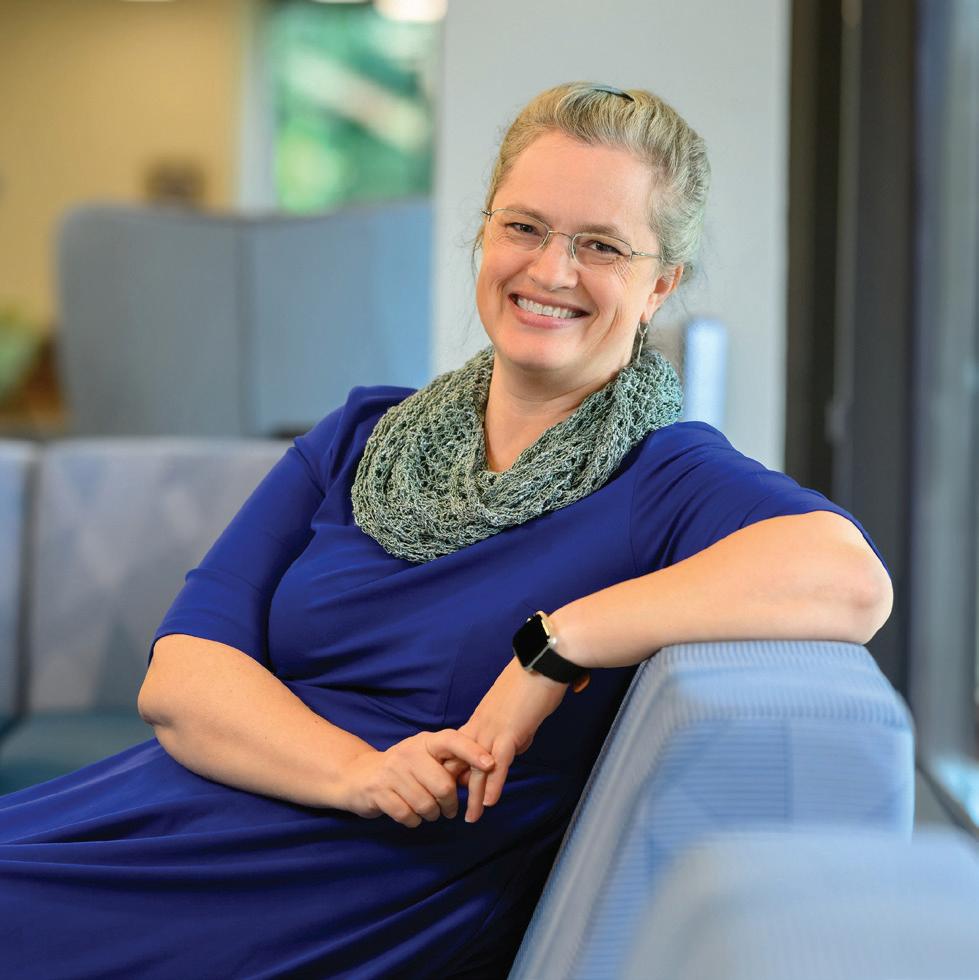
Faithful support from the university, alumni and the community over the last two and a half centuries has been key to the library’s continued success. Please reach out to me if you have questions or ideas for the library’s past, present or future.
Thank you for being a friend!

Prof. KT Vaughan , MSLS, EdD Professor and Hal F. and Barbra Buckner Higginbotham University Librarian Washington & Lee University kvaughan@wlu.edu
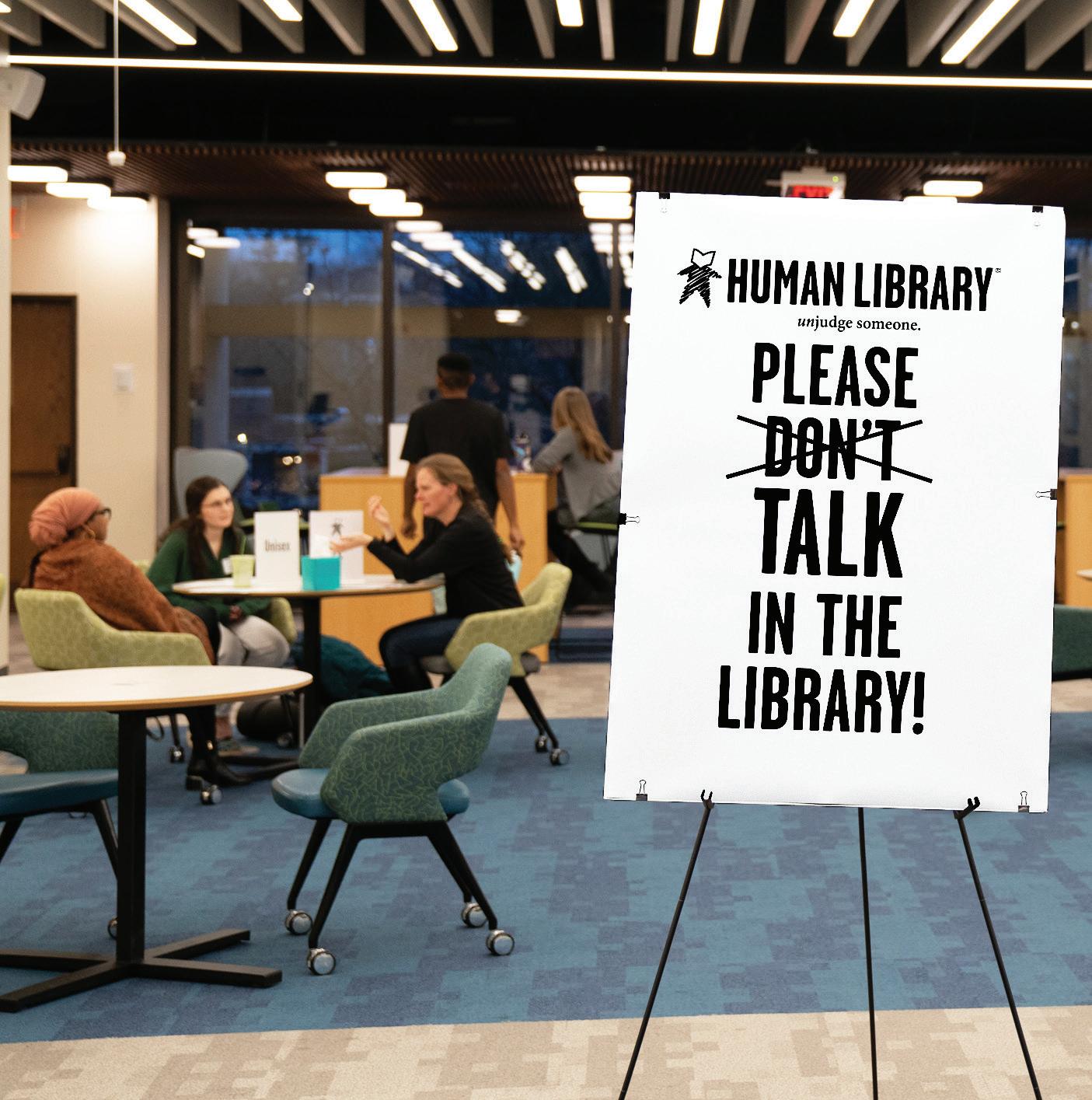
Kelsey Goodwin examines the impact of the Human Library in fostering connection.
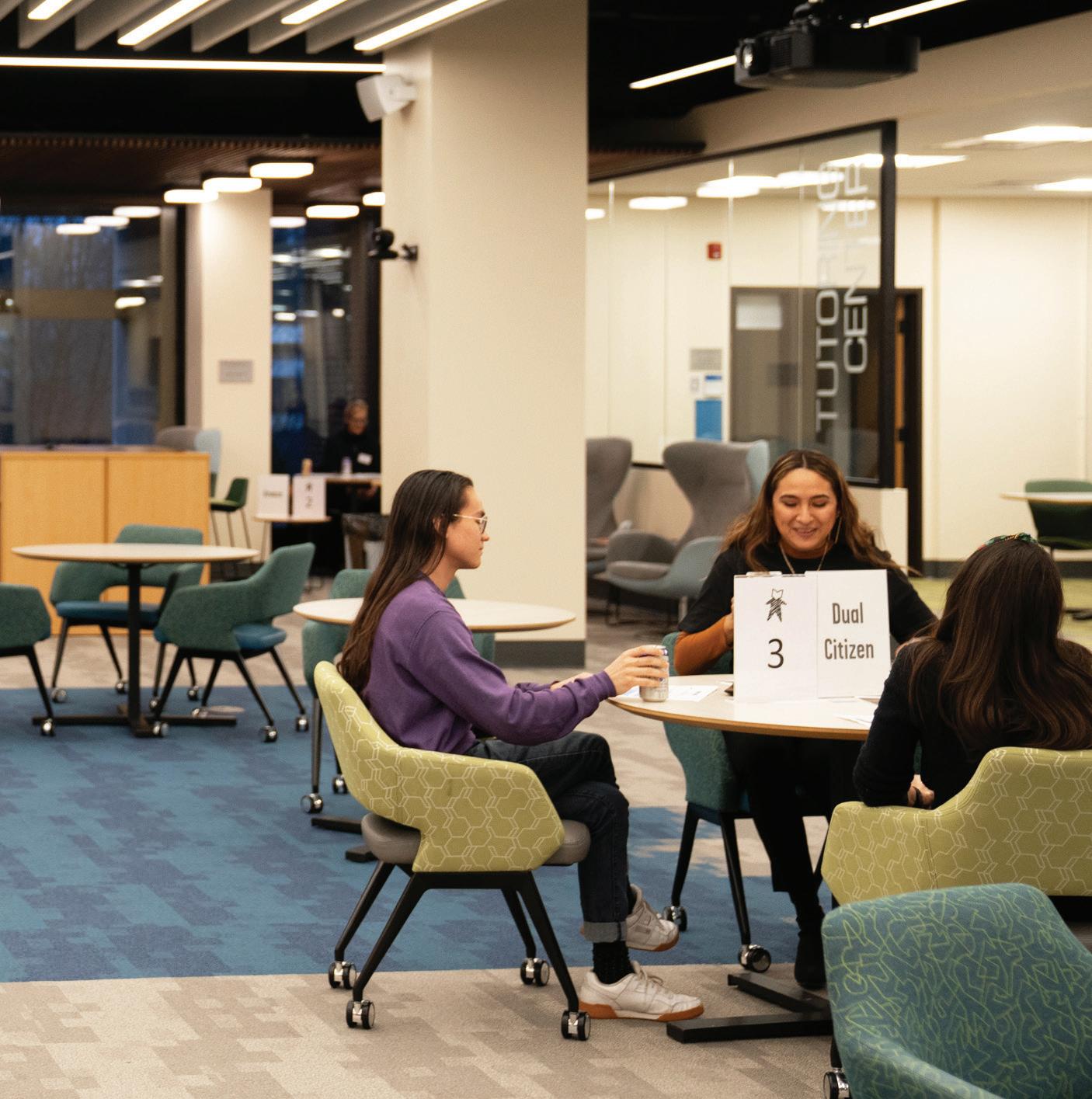
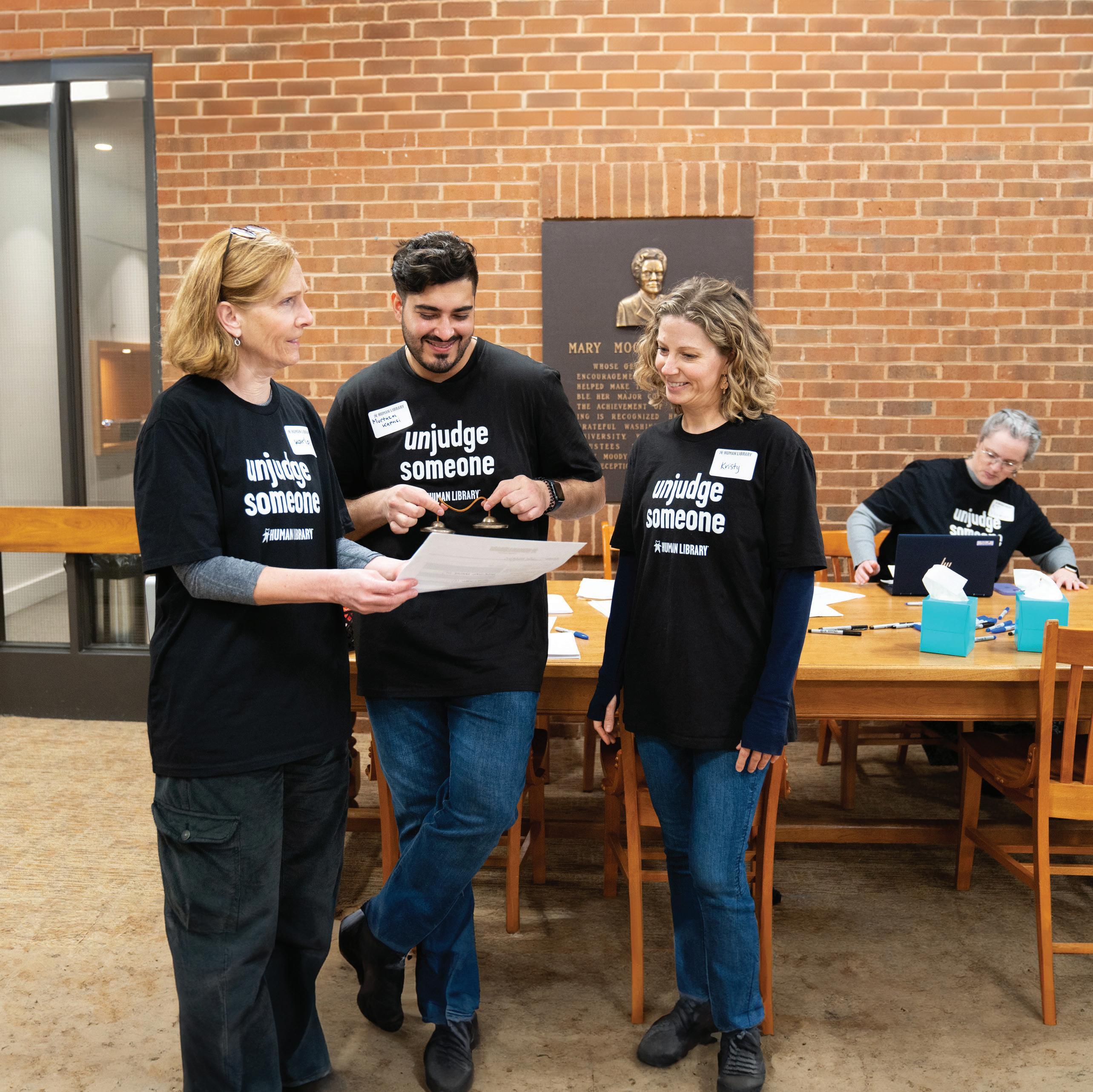
on the evening of Jan. 24 may have noticed a buzz of activity in the Harte Center for Teaching and Learning. The space served as the backdrop for a new programmatic partnership between the University Library and W&L’s Mudd Center for Ethics called the Human Library.
The Human Library aims to challenge stereotypes, prejudices and discrimination by fostering direct, open and honest conversations between people — volunteers who agree to share their stories and volunteer Readers who are invited into a dialogue with the Book. Human Books share their personal stories and experiences, known as the Book’s Title, and Readers are invited to ask questions to further their understanding of the human behind the label and challenge their preconceived notions.
Human Librarians, members of an organizing committee that included staff and faculty from the Mudd Center, the University Library, Human Resources and Alumni Engagement, wore black-and-white shirts bearing the phrase “unjudge someone” and milled around on the first floor of Leyburn Library outside the Harte Center as the event began to answer questions and greet event participants as they arrived. Readers filtered in and took their seats in the Harte Center, while Books waited in Northen Auditorium to be called into their first of three group sessions. The event was divided into three sessions, allowing participants to interact with a variety of books represented in the room.
“Everybody has a story,” said Karla Murdock, director of the Mudd Center for Ethics from 2021-24 and Jo M. and James M. Ballengee Professor of Cognitive Behavioral Science. “The Human Library is designed to help us find connection within stories that aren’t always told or understood. It protects space for us to be genuinely curious about another person’s experience, to talk about things that can otherwise feel off-limits and to notice a mismatch between our assumptions and their reality. Hearing another person’s story in full color may be the best vehicle for learning to sense and question the automatic judgments we make.”
The Human Library project was created by Ronni Abergel, a Danish social worker, activist and youth advocate. Abergel founded the Human Library in Copenhagen, Denmark, in 2000 with the core mission of addressing prejudice. Abergel, drawing on his experiences in youth work and social activism, wanted to create a platform that would facilitate direct, personal interactions between individuals who may hold biases or stereotypes and those who have experienced discrimination. W&L’s Human Librarians worked closely with the Human Library project’s offices in Denmark for over a year in advance of bringing the event to campus. Applications for members of the campus community to volunteer as Human Books opened Oct. 1, 2023, and included an interview process with the committee. Human Books often belong to groups that face stereotypes or prejudices, such

as those related to race, religion, gender, sexual orientation, disability or other aspects of their identity, and Book Titles typically reflect a concise label a Human Book has chosen to represent the part of their personal story they will tell at the reading. People interested in learning and engaging in dialogue attend the event to “borrow” a Human Book for a set period. During this time, they have a conversation with the Human Book, asking questions and gaining insights into the Book’s experiences. Human Librarians oversee the entire process, ensuring a respectful and positive environment. They also help match Readers with Human Books based on their interests or the topics they want to explore.
Cole Gershkovich ’24 participated as a Human Book, titled “OCD and Depression.” Gershkovich wanted to be a Human Book to help people understand the nuances of his experiences with OCD and depression operating in tandem. “My hope is that this knowledge would inspire Readers to consider ways to promote inclusivity and understanding regarding people living with similar experiences,” Gershkovich said. “I was also excited to be able to connect and feel seen without the filter of stigma and social expectations. I would love to see the conversations we had through the Human Library keep resulting in what I have already experienced happening: people reaching out and expressing interest in continued conversations that make everyone involved feel opened up and less afraid for the aspects of themselves usually kept in the dark to be seen and appreciated by others.”
the Human Library concept has gained popularity and expanded to numerous countries worldwide through events organized by local libraries and community organizations.
“Libraries have existed for centuries as community spaces where people can read and learn from the printed word. We were excited to bring the Human Library to W&L, and to host it in Leyburn, as a way to connect living Books and interested Readers in a familiar and nonjudgmental space,” said KT Vaughan, Hal F. and Barbra Buckner Higginbotham University Librarian. Murdock said that a university library setting is an ideal fit for the event, particularly within the context of the Mudd Center’s mission to foster multidisciplinary and collaborative opportunities for reflecting on important ethical issues in public and professional life.
Kelly Fujiwara found the experience of sharing her story as a Human Book to be authentic, compassionate and “exhausting in a good way,” adding that she felt a sense of hope
and positivity after the evening’s conversations. Fujiwara, who serves as the special events coordinator for Lee House, shared her journey as a cancer survivor, an experience that she said had opened her up to listening to others more intentionally and applying more empathy to her daily life.
I was diagnosed with cancer at 24 and have lived with that ever since,” said Fujiwara, “and I met so many people through that experience from all walks of life who were willing to share their stories and their pain with me.” Fujiwara said she was glad to be able to share the perspective shift she received from her cancer journey with attendees at the event.
For Reader Katie Yurechko ’24, the event was an opportunity to understand the individuals behind the titles represented in the room.
“It is especially rare — in a time when intentional conversations, particularly with people whom we have not yet met, become rarer each day — to listen wholeheartedly to others’ stories and respond to them with all of your heart’s compassion and mind’s questions,” Yurechko said.
from both Readers and Books themselves is crucial, according to Murdock. Human Library committee member Kristy Crickenberger, assistant director of training and development for Washington and Lee’s Office of Human Resources, said the goal of the event is to help Readers acknowledge that it is a natural human trait to make assumptions and that she hoped that readers left the event with increased compassion when interacting with new people.
“The hope on the grander scale is that this will have a ripple effect and that every interaction that the Reader has thereafter will be comprised of less judgment, less assumption and more curiosity than judgment,” Crickenberger said.
Since its inception, the Human Library has grown into a global movement, with events organized in numerous countries, highlighting its effectiveness in fostering meaningful connections and breaking down barriers. Murdock and Vaughan hope that W&L can continue to host the event annually, a sentiment echoed by the evening’s attendees.
“The Human Library event creates a unique pocket within our fast-paced world for us to practice the all-too-valuable skills of interpersonal communication and nonjudgmental introspection,” said Yurechko. “The event challenges you to confront your preconceptions and/or misconceptions about others’ lived experiences while reflecting on how you engage across differences to learn about lives other than your own.” n
THE HOPE ON THE GRANDER SCALE IS THAT THIS WILL HAVE A RIPPLE EFFECT

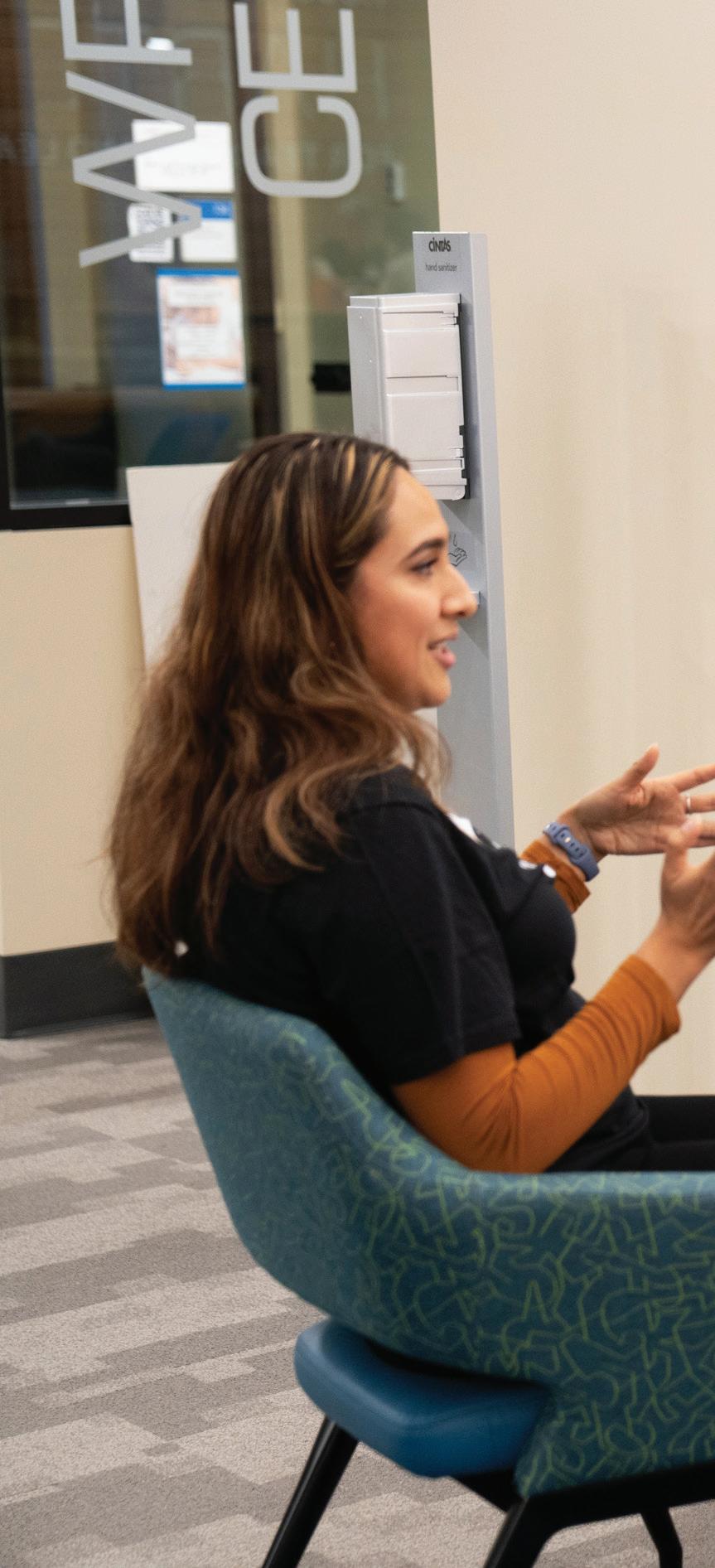
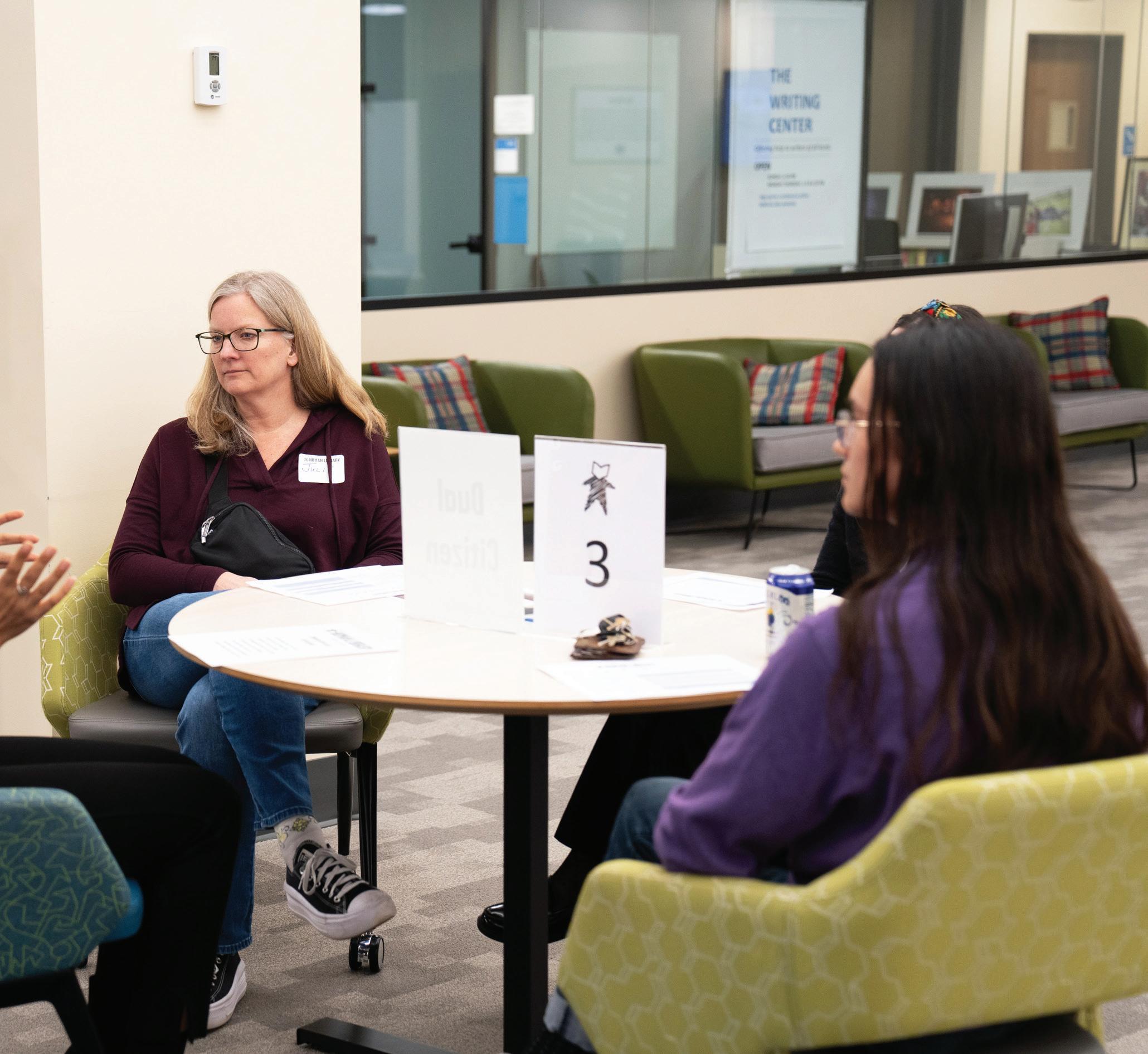
Kim Sims explains how to celebrate the literary journal’s storied legacy through an interactive exhibit.
anew exhibit is open in the gallery outside of Special Collections and Archives. Co-curated by students Nora Jacobson ’26, Sloan Criner ’25 and Malachi Zarahn ’28 under the direction of assistant professor of English Beth Staples, editor of Shenandoah, the exhibit celebrates the 75th anniversary of the literary journal founded in 1949 at Washington and Lee. The curators partnered with the IQ Center to create an interactive piece, and Tom Wolfe ’51’s typewriter is on display as well. The exhibit will be up through Commencement.
In addition to the exhibit, we are excited to announce that the collection guide for the Shenandoah records is now available online at go.wlu.edu/collection-guide Collection guides are the standard discovery tool used to both increase discoverability and to help inform researchers if a collection might be helpful in their research. The collection features correspondence and manuscripts, and the majority represent the tenure of editor James Boatwright, professor of English. n
OPPOSITE: Langston Hughes’ letter to the Shenandoah editor dated May 29, 1953.


TThe Library Student Advisory Board (LSAB) had an exciting 2023-24 school year. It began with a generous donation of succulents that were handed out at the student activities fair. This helped grow excitement and brought in a whole group of first-years to join the advisory board. We held meetings once a month to get student feedback on various aspects of the library, such as the Harte Center’s Pop-In and Study event, as well as plan our big events. Each term, LSAB tabled during finals week with treats and words of encouragement for stressed-out students in both Leyburn and Telford libraries. Additionally, there were tables positioned on Leyburn Library’s main floor as positivity stations and a study break location. This year, the positivity stations included bracelet-making, grab-and-go candy and stickers, encouragement note cards to make and take, coloring and more. Students gravitated toward it. The positivity stations were located near the
Additionally, a change that LSAB made this year was to not only hold planning meetings but also do some more hands-on projects. In December, LSAB members helped wrap and decorate books for the “Unwrap a Mystery Match” display. In January, LSAB teamed up with Mackenzie Brooks, associate professor and digital humanities librarian, of the DCI department and Mattie Clear, assistant professor and archivist, in Special Collections and Archives to create prints on a printing press and use shaving cream to make marbled paper. LSAB members loved the experience to learn new skills, explore more of what the library can offer and to bond more as a group. Finally, in April, LSAB members learned how to make art with felt from Laura Campbell, public safety technology manager. These fun activities helped connect LSAB to more areas of campus and the library community, while also bringing a lot of joy and engagement with the organization as a whole.
Kayla Monaghan highlights LSAB’s transformative year in the library.
relocated game zone. Last year, the game zone was a new addition to the library that LSAB helped organize. This year it has doubled in size. In the center of the main floor, students have a space to do puzzles, play chess or other games or enjoy the Leyburn-themed coloring books along with other supplies in the new craft zone that has been added. Thanks to a gracious gift from the Friends of the Library, power outlets were put in so students can use the game zone and charge their devices, drawing more people to the space. To help fund various projects, LSAB held two book sales. A cart was set up to collect donations throughout the school year. Then, during weekends with heavy alumni traffic, LSAB set up successful book sales. Using the funds generated, LSAB was able to have a Valentine’s Day craft station with options to share what books people loved, create a book display called “Unwrap a Mystery Match,” which is similar to the popular trend of “Blind Date with a Book,” and added more art to study rooms throughout the building to make the library feel homier for students.
The biggest accomplishment for LSAB this year was the LSAB Lounge, otherwise known as Leyburn 401 on the fourth floor. Formerly a dark, almost somber space, LSAB wanted to bring new life to the room. The room was repainted, fairy lights were added, art was printed and hung on the walls, Lego flowers were built and displayed, and all of the books collected for the spring book sale found a home on the shelves. Since these changes have been made librarians have noticed that the room is seldom empty, with at least one or two students using the space. The positive feedback from students has been exciting, and LSAB wants to continue brightening up the library in the 2024-25 school year. Ultimately, the goal of the Library Student Advisory Board is for students to have their voices heard and help make Washington and Lee’s libraries a place that students enjoy and cherish. This year, LSAB has continued to pursue this goal and has had so much fun in the process. n
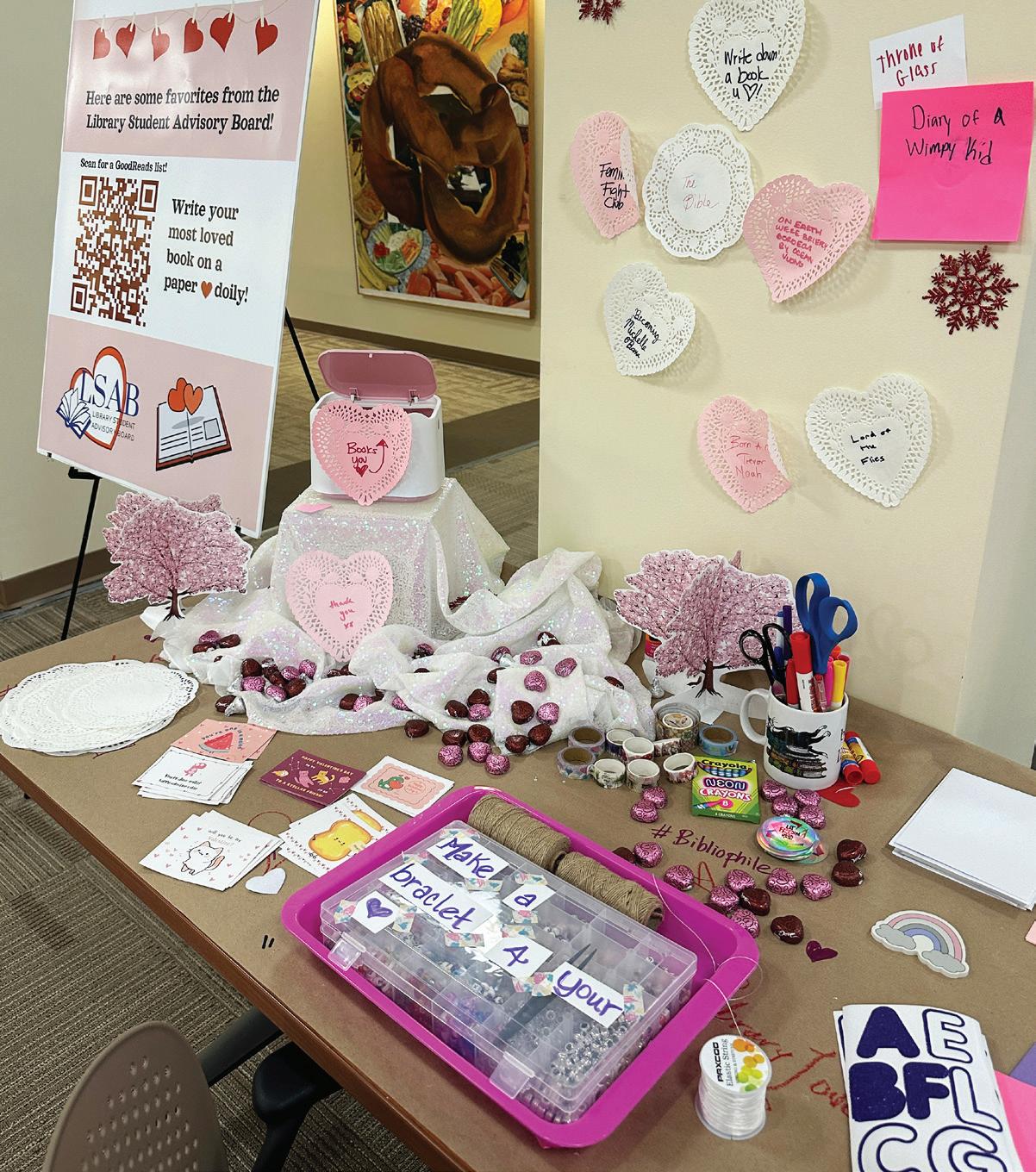
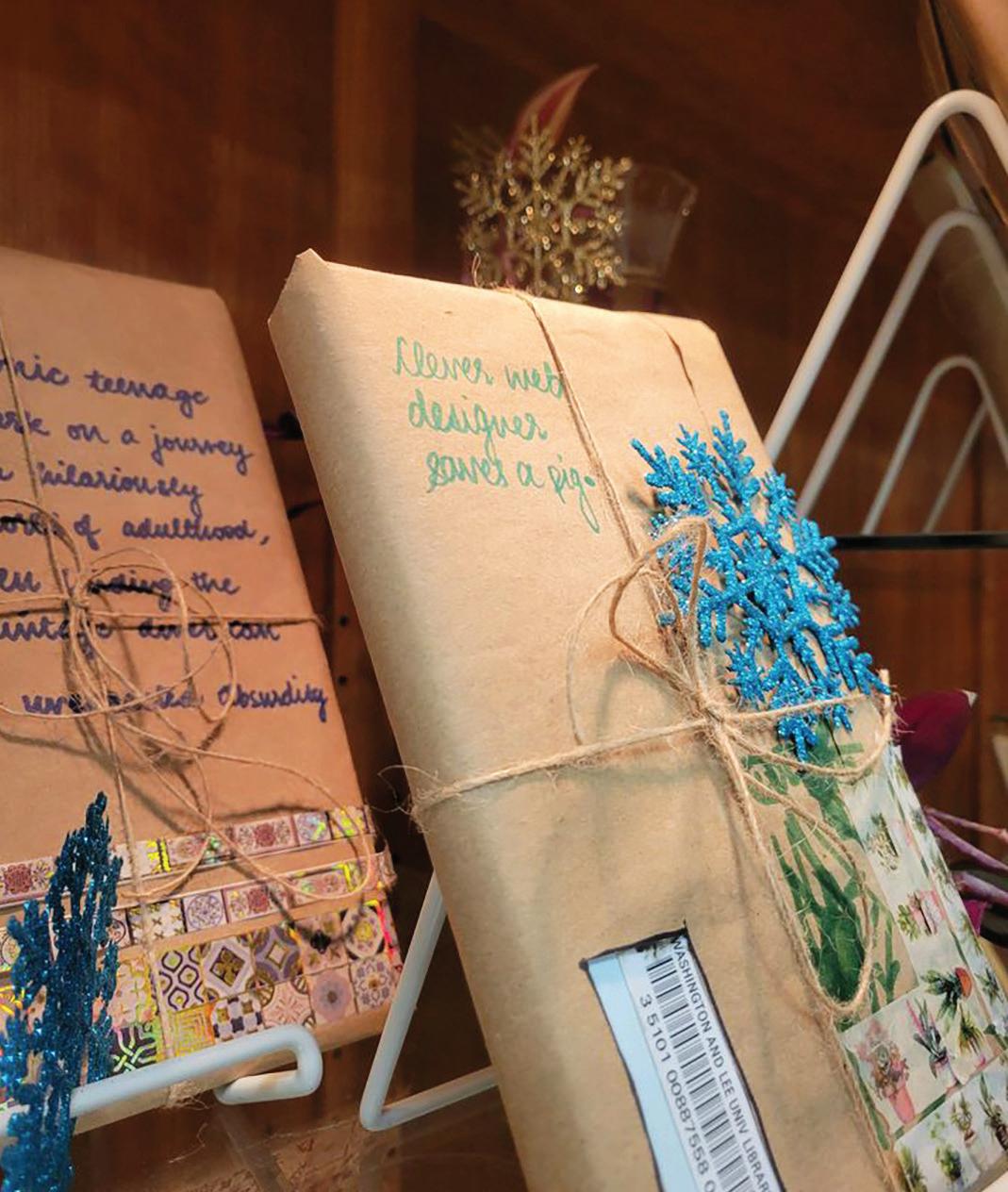
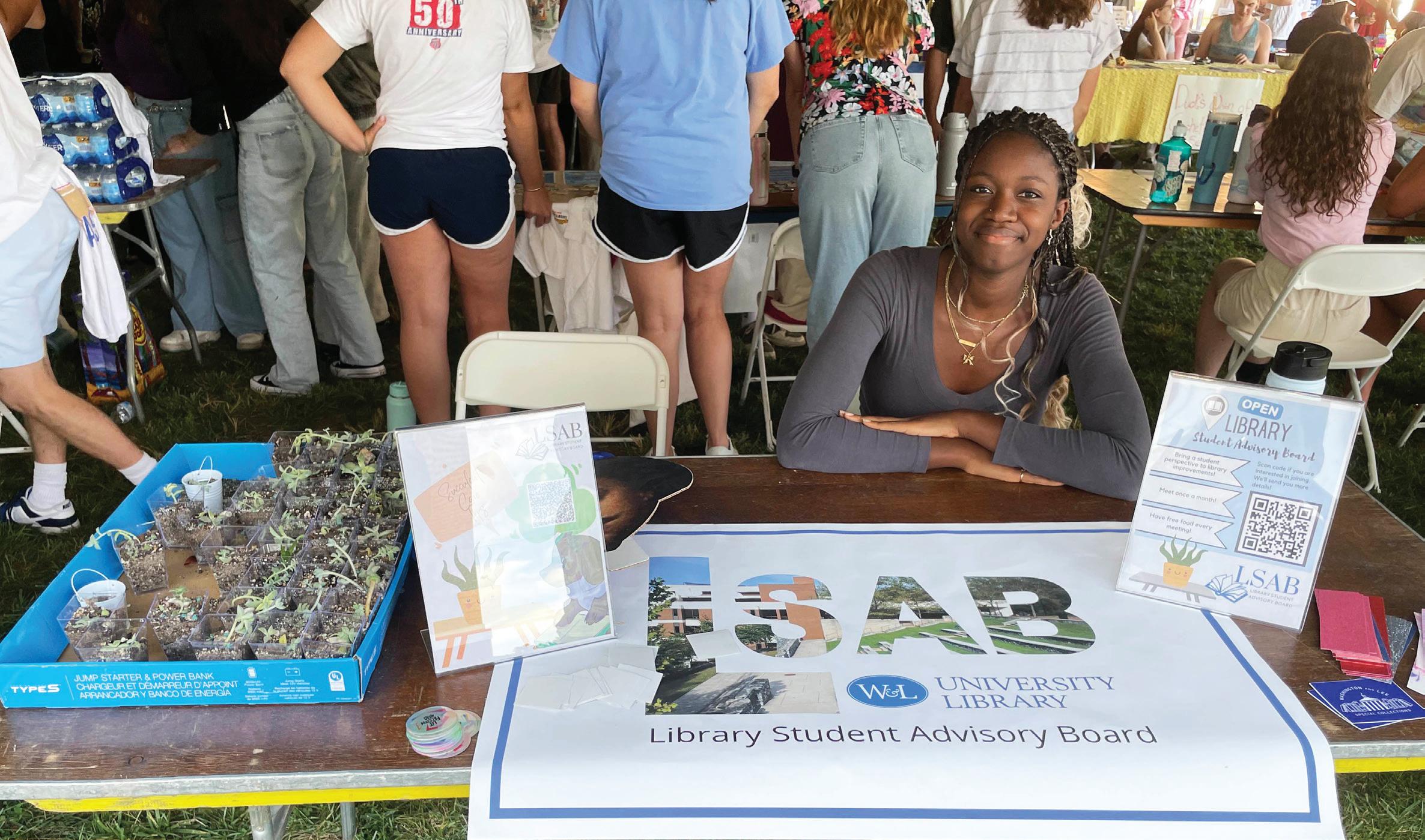
Jenny Carlos explores the integration of artificial intelligence in education.
Artificial Intelligence (AI) has been a topic of discussion over the last couple of years, and as the discussion has evolved to incorporate how it will impact education, the librarians have been busy keeping abreast of the latest AI news. The librarians have been learning and using AI this past year in a variety of ways, from teaching students how to use AI to making student worker training more interactive — and fun. Keep reading to find out how they have been using AI >>>
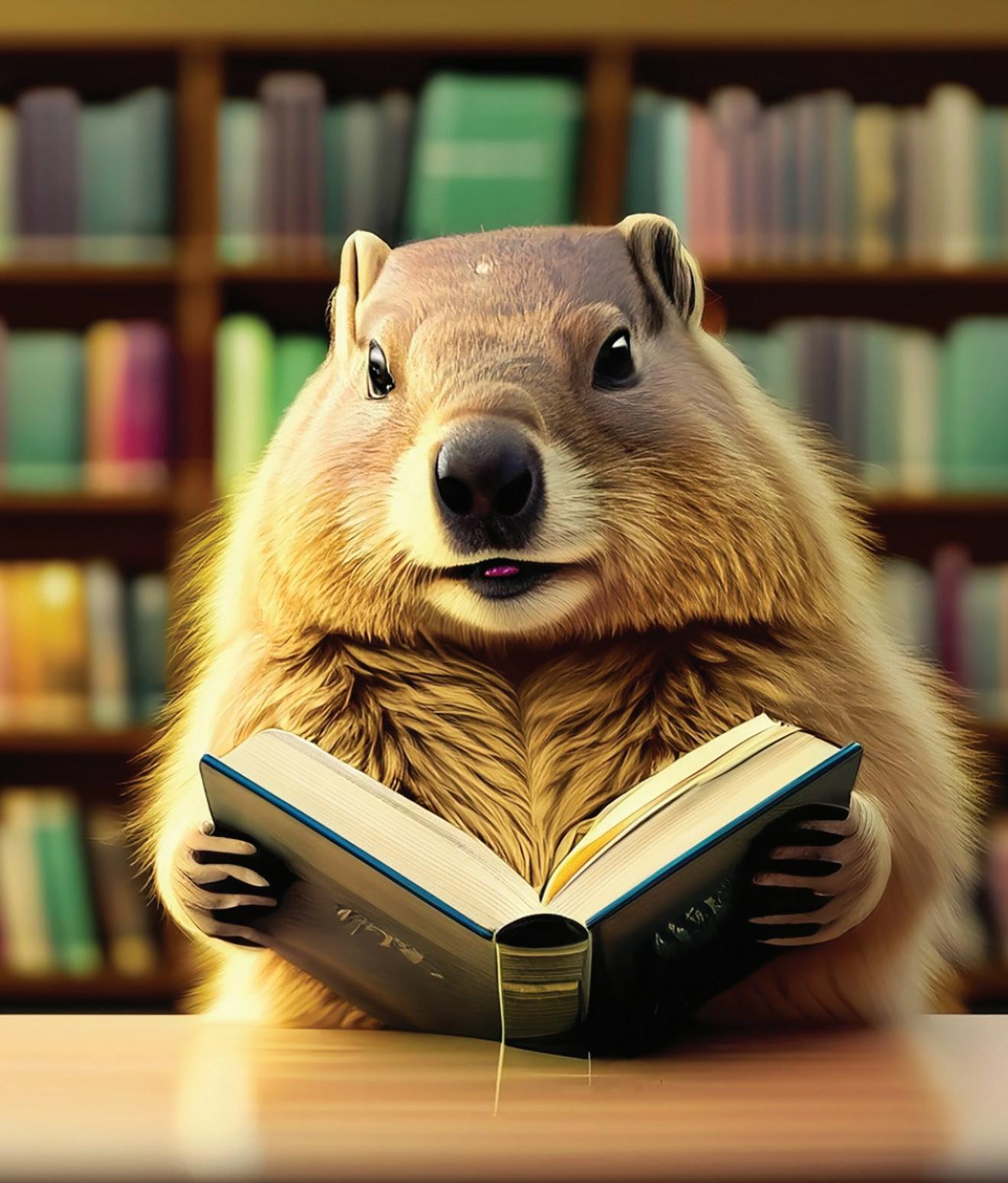
Where do you turn when your neighborhood varmint refuses to strike a pose for W&L's Groundhog Day email? Wendy Rains decided to give A.I. a whirl, generating an image by simply asking for a cartoon groundhog reading a book in the library. (Because when your furry friend is too busy avoiding the spotlight, why not just let technology do the heavy lifting?)
emily Cook, instruction librarian for the humanities, is an early adopter of AI and has been using it in different ways this past academic year. Paired with her innovative thinking, she used ChatGPT, a popular AI tool, to create a shelving simulation game for student workers to learn the Library of Congress Classification. Cook has also used this same simulation during her classroom visits as a learning tool for students to navigate finding a book in our physical collection. She also addressed the assumption that ChatGPT will make librarians irrelevant.
“I’ve challenged that assumption through the use of in-class demonstrations with ChatGPT,” Cook says. “On several occasions, I began a research tutorial by pulling up ChatGPT and typing in the following question in real time: ‘Does ChatGPT, and other AI tools, obviate the need to learn traditional library database search skills when doing academic research?’ Often surprising students, ChatGPT replied with some permutation of the following sentiment: AI serves as a useful tool when doing research, but it does not invalidate the need for traditional research skills, like understanding one’s information environment, being able to evaluate sources and accessing specialized resources.
“Because this sentiment came directly from ChatGPT, and not from a librarian who may have a perceived bias concerning the topic, students more readily engage with subsequent instruction,” she continued.
“Additionally, I have compared multiple AI tools (both free and subscription-based) with library databases using a constant prompt in order to illustrate to students how, and why, content varies across platforms.”
Cook, alongside Elizabeth Teaff, assistant university librarian and head of access services, are experimenting on how they can utilize AI on the library’s website to answer patrons’ frequently asked questions.
Other librarians are also incorporating AI into their work and learning how to use AI
,,themselves. For example, Mackenzie Brooks, digital humanities librarian, covered AI as part of the curriculum of Introduction to Digital Culture and Information (DCI 101). Several students chose to examine the impact of AI on their prospective fields for their final research project. Paula Kiser, digital scholarship librarian, used AI in her DCI course to assist with the
AI serves as a useful tool when doing academic research, but it does not invalidate the need for traditional research skills, like understanding one’s information environment, being able to evaluate sources and accessing specialized resources.”
transcription for oral histories. Kiser also used AI to help with a migration project.
“It’s saved me a lot of time because it pulls from a lot of the sites that I would be searching, and it can combine multiple commands based on what I’m telling it to do,” Kiser says.
Amira Walker, research and instruction librarian, has been learning how to use AI to understand how students might be using ChatGPT. She has also used ChatGPT to create conference materials.
In my role as research and instruction librarian for the Williams School, I have been immersing myself in learning how to leverage AI in higher education. I am part of Moxie (formerly Academic Insights Lab), which is an AI hub that meets weekly to discuss the latest news in AI. I was also accepted into the Associated Colleges of the South’s working group on AI and will have two book chapters published early next year on using AI in the education field. We can anticipate that as AI further changes the landscape of higher education, our librarians will continue to inform themselves to be able to help the Washington and Lee University community. n
“I have been immersing myself in learning how to leverage AI in higher education.”
JENNY CARLOS ASSISTANT PROFESSOR, RESEARCH AND INSTRUCTION LIBRARIAN
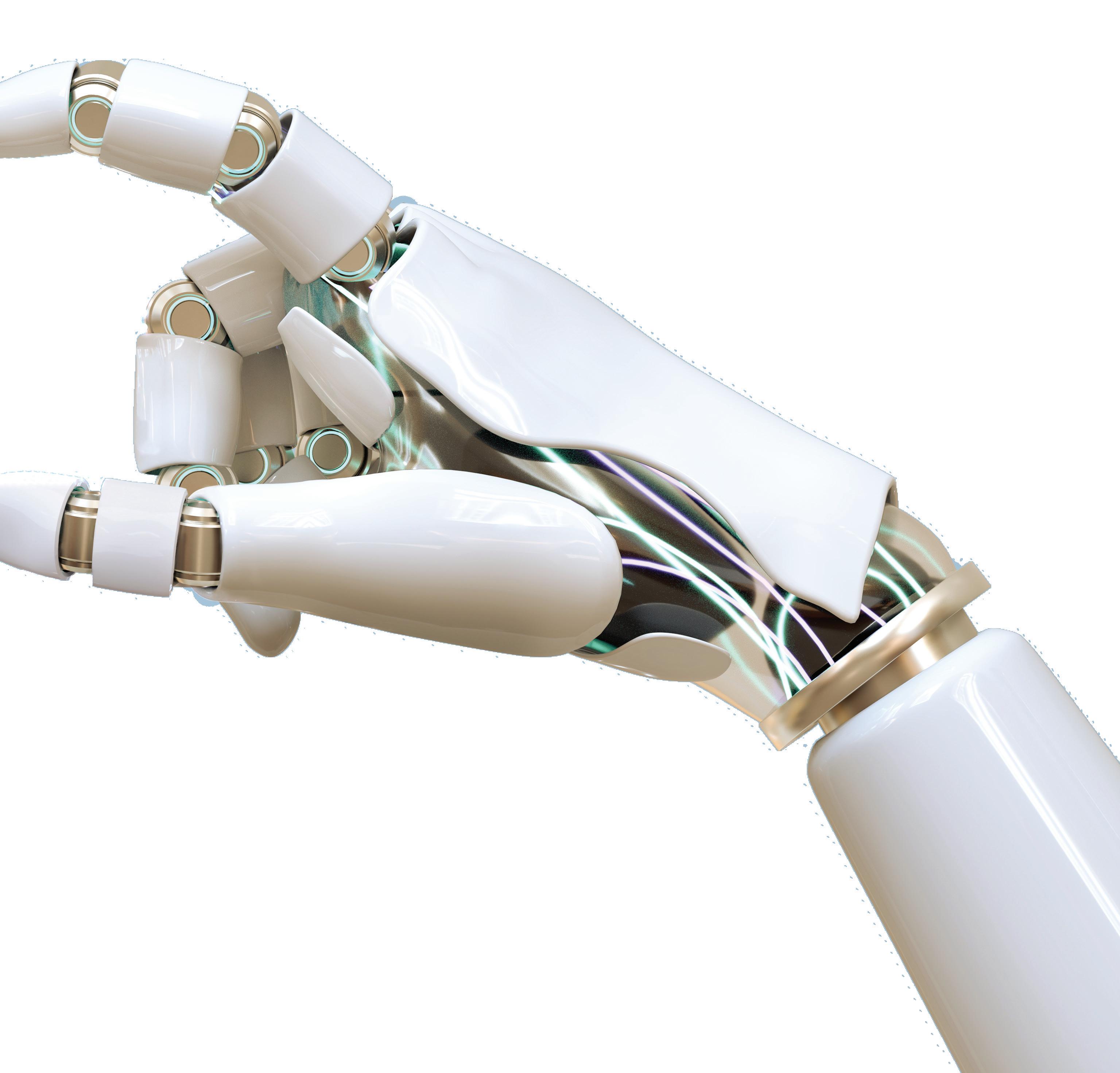
Jenny
Mitchell
uncovers how W&L Law is preserving the legacy
The Wilbur C. Hall Law Library has the distinct honor of housing the archives of Supreme Court Justice Lewis F. Powell Jr. The mission of the Powell Archives is to collect, preserve and facilitate access to the rare and unique materials that document the history of the law school and its students, faculty and alumni. The Powell Archives opened in 1991 to house the personal and professional papers of retired Supreme Court Justice Powell. The establishment of the archives provided the Washington and Lee University School of Law with an opportunity to bring together collections that had already been acquired by the law library but remained inaccessible.
The heart of the collection is Justice Powell’s personal and professional papers, offering a comprehensive view of his life from his education to the Supreme Court and beyond. The books, memoranda, correspondence, speeches, photographs and more offer a complete picture of an accomplished and full life as well as a unique view into the inner workings of our nation’s highest court. Alongside Justice Powell’s papers, the archives house collections from individuals like Virginia Congressman M. Caldwell Butler, civil rights activist and law professor Frank R. Parker and Secretary of War Newton Diehl Baker. In addition to these larger collections, the archives preserve records documenting the history of the law school. These records include papers and publications documenting the professional achievements of its faculty and alumni.
The collections in the Powell Archives are available for use in the classroom. Incorporating archival research into coursework can significantly enhance the learning experience. Professors can assign projects that require students to utilize the Powell Archives to analyze archival sources, develop critical thinking skills and construct well-supported arguments. For
“The books, memoranda, correspondence, speeches, photographs and more offer a complete picture of an accomplished and full life.”
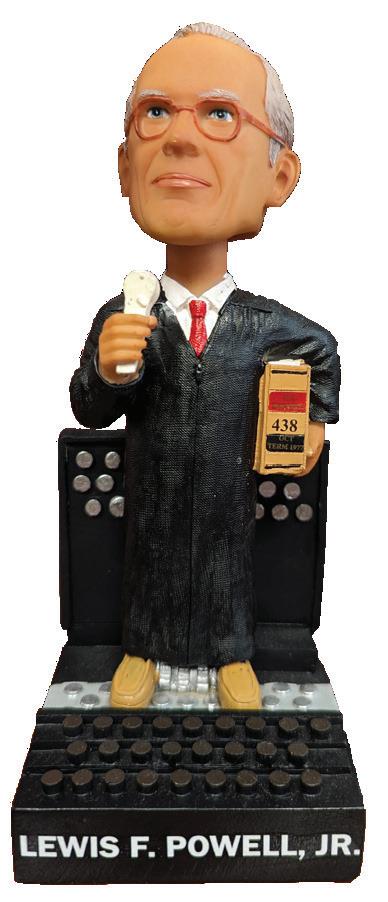
example, a history course might task students with conducting primary source analysis to develop research questions and write historical papers. A political science course could allow students to examine historical policy documents to understand the rationale and consequences of past decisions.
Beyond the classroom, the Powell Archives serve as an invaluable resource for independent research. Researchers from diverse fields have utilized the Powell Archives to explore a wide range of topics. The Powell Archives attracts scholars from a number of disciplines including history, political science and law. It has been used by graduate students, law faculty, scholars and journalists. The Powell Archives offer a unique and invaluable resource for students eager to delve into the complexities of American history and law. From in-depth analyses of Justice Powell’s jurisprudence to broader studies of civil rights and political history, the archives offer a wealth of material for exploration.
To facilitate use by students and researchers, the Powell Archives have made significant investments in accessibility. The digitization of selected materials in the collection, coupled with online finding aids, has made it easier for researchers to navigate the archives and locate relevant sources. By providing a platform for discovery, the Powell Archives empower students to become independent researchers and critical thinkers. The skills developed through archival research are transferable to a variety of fields and will serve students well throughout their academic and professional careers. n
If you have questions or would like to make an appointment to view materials from the Powell Archives, reach out to Jenny Mitchell, archivist and Special Collections librarian, at powell@wlu.edu.
Lewis F. Powell Jr. for today's students — and for our future scholars.
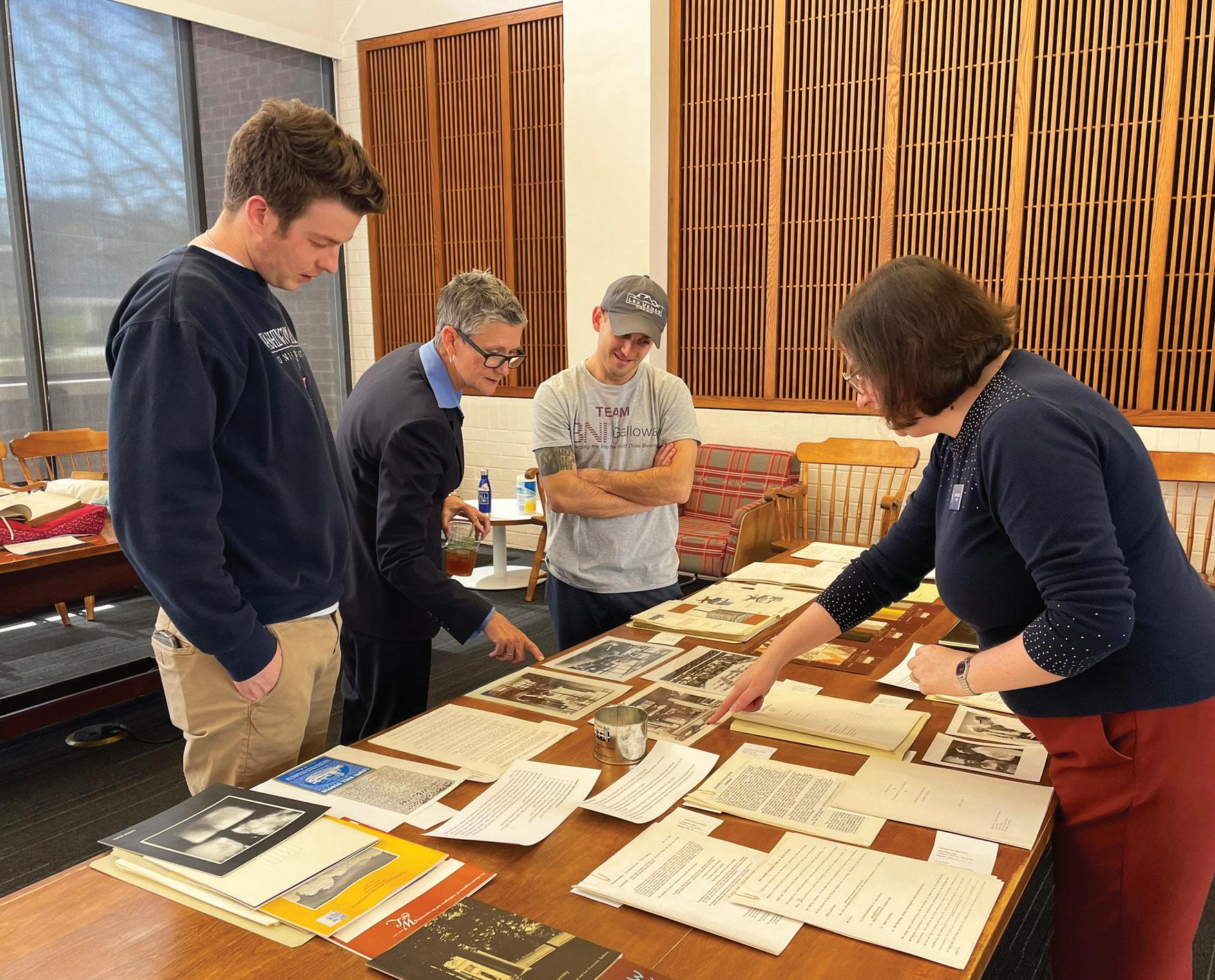
Written communication:
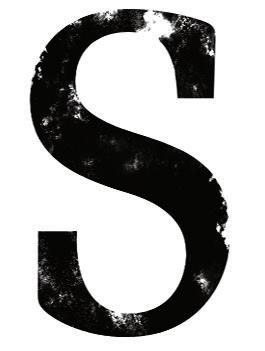
Mackenzie Brooks shares how W&L's Book History Teacher-Scholar cohort brings print history to life.
ince 2021, a small group of W&L staff and faculty have met regularly to discuss a topic close to the heart of the library: book history. Started by Caleb Dance, associate professor of classics, and eagerly supported by University Library staff and faculty, the Book History Teacher-Scholar cohort has been generously funded by the Office of the Dean. Over lunch, cohort members share updates on their book history research, show off new acquisitions in Special Collections or brainstorm class project ideas.
The cohort has featured several special guests. At the invitation of Brian Alexander, associate professor of politics, Special Collections welcomed Bill Barker, also known as “Thomas Jefferson,” for a costumed tour of important books in Jefferson’s life. Some readers may remember that Special Collections holds a copy of Jefferson’s “Manual of Parliamentary Practice” featuring annotations by Jefferson himself. In March 2024, the cohort sponsored a book talk by Stephanie Stillo, chief of the Rare Books and Special Collections Division at the Library of Congress and former
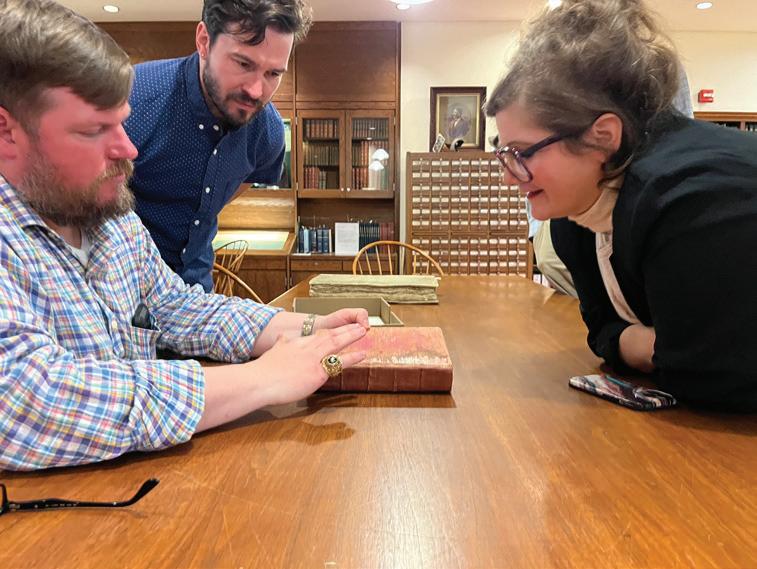
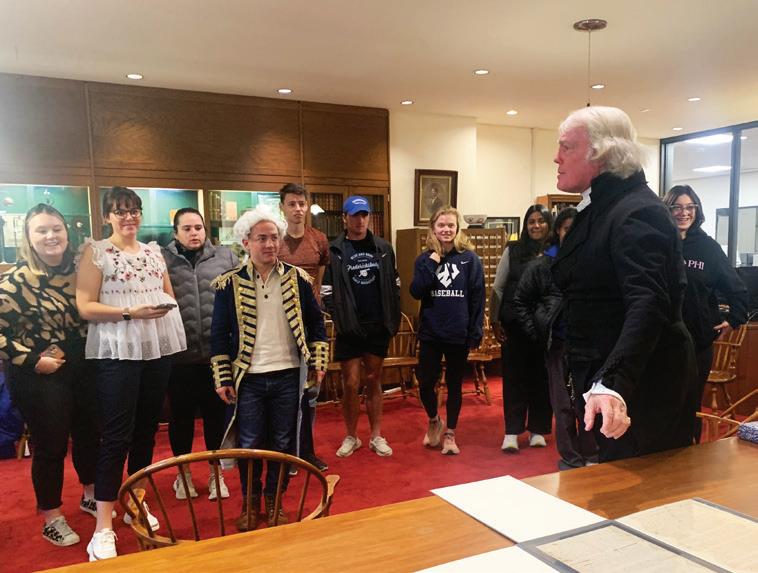
Andrew Mellon Postdoctoral Fellow in Digital Humanities at W&L. Stillo introduced us to her upcoming book on the history of book illustration and spent some time encountering W&L’s own collections.
The energy of the Book History cohort has also led to the acquisition of four tabletop printing presses — three that resemble proof presses and one that mimics a common press. The presses provide a hands-on way for students to experience the process of setting type and making a print. The presses have made an appearance at the Academic Fair, spent an evening with the Library Student Advisory Board and have found their way into multiple digital culture and information and English classes.
One of the long-term goals of the Book History cohort is to design a co-taught Spring Term course on book history, tentatively titled From Stone to Smartphone: The Materiality of Reading. Both Dance and Mackenzie Brooks, associate professor and digital humanities librarian, have been taking courses at the Rare Book School at University of Virginia to prepare themselves for teaching such a course. n
Test

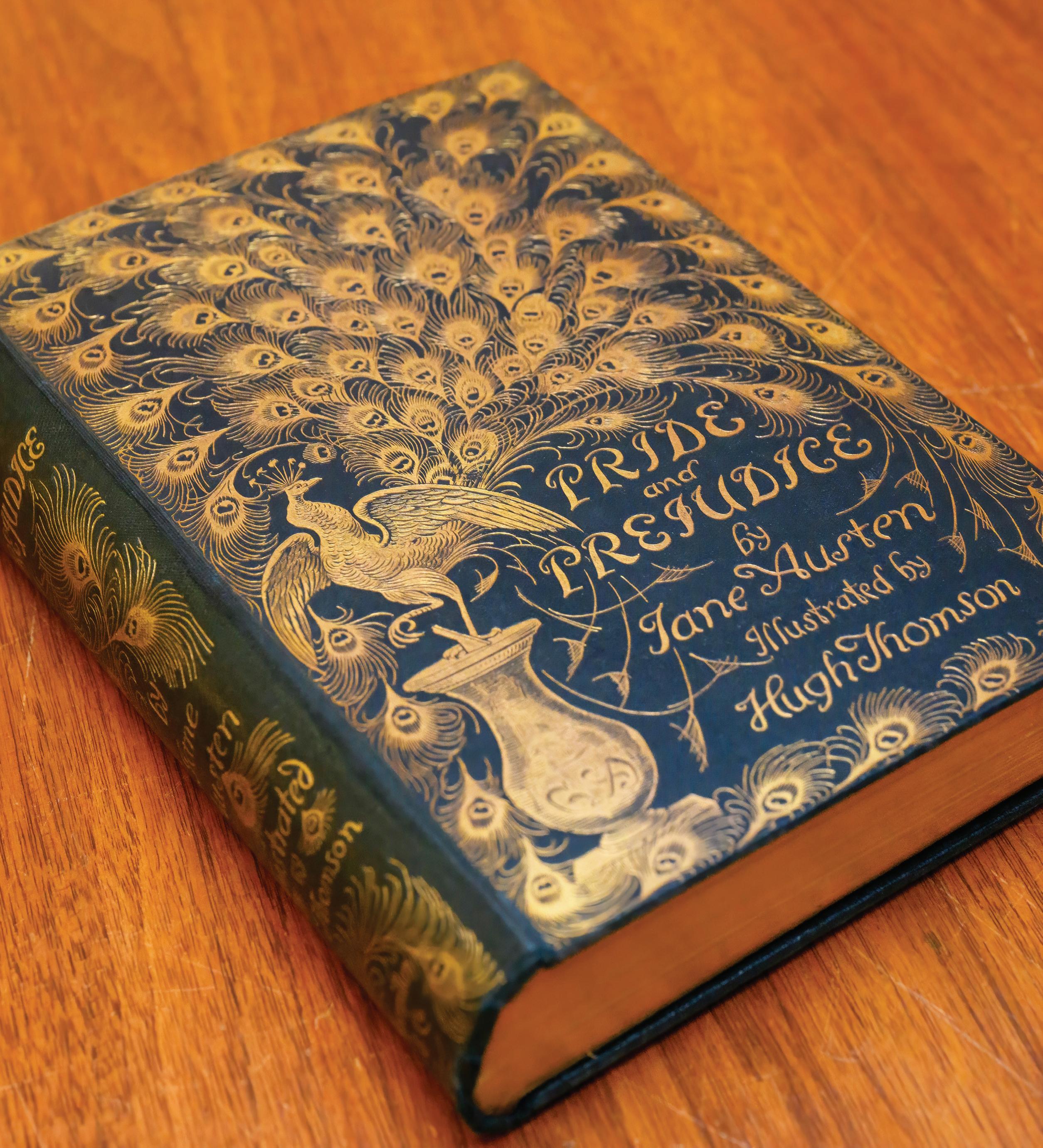

Kim Sims reports on prioritizing curriculum needs with rare finds and diverse narratives.
TThe Special Collections and Archives team stewards an amazing collection of manuscripts, archives, rare books, photographs and audiovisual items, among other things. Our collecting foci are primary source materials related to the city of Lexington, Rockbridge County, the valley of Virginia and institutional history. This isn’t likely to be a surprise to most of our readers, but what might be news is learning that over the past academic year, we’ve prioritized our collecting focus in service to the Washington and Lee curriculum. As a unit within an academic institution, our priority should be supporting our student and faculty needs. We don’t do this at the expense of other collections, but we do include curricular needs as part of our evaluation process for identifying items for purchase and in assessing whether we should accept a potential donation.
We’re excited to share with you examples of new acquisitions that were purchased specifically to support the curriculum and for classroom use.
In preparing for a faculty consultation regarding a 2024 Fall Term class, we discovered that Special Collections and Archives didn’t have a copy of Jane Austen’s “Pride and Prejudice.” A first-edition copy was out of our price range, but we were able to purchase a well-known later edition that is generally referred to as the Peacock edition. Published in 1894, the Peacock edition includes a beautifully embellished cover of a peacock and illustrations by Hugh Thomson. The volume we purchased was signed by Thomson.
OPPOSITE: “Pride and Prejudice” (Peacock edition) by Jane Austen (author), Hugh Thomson (illustrator), 1894

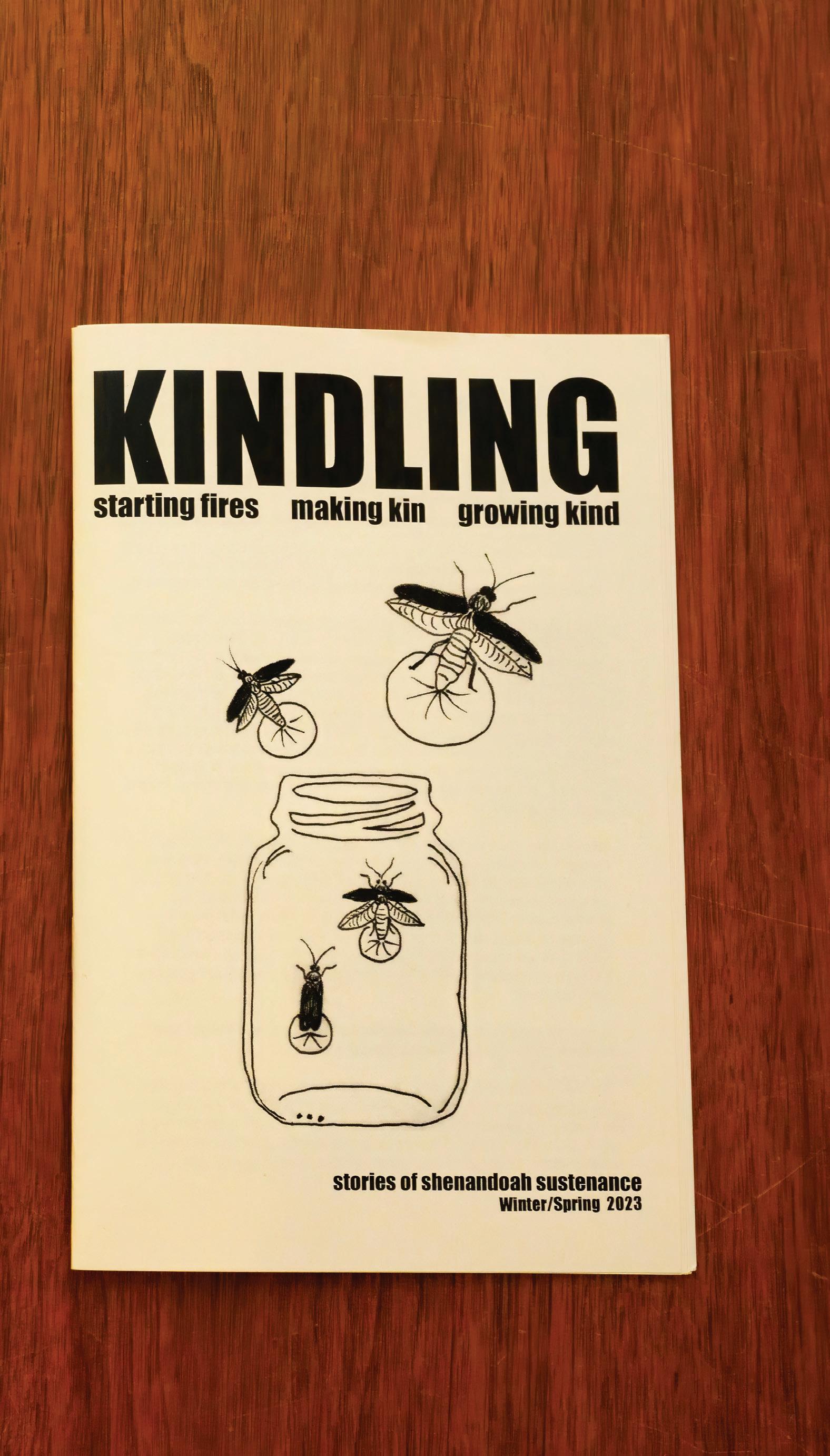
We established a zine collection in Fall 2023. Zines are an economical and effective way to incorporate narratives and communities that are often underrepresented. Self-published in limited quantities, zines are a perfect example of the statement “Just because a book is rare doesn’t mean it’s old.” Our zine collection covers topics such women’s reproductive health, activism, queer themes and mass incarceration and currently includes more than 50 titles.
OPPOSITE: Examples of newly acquired zines
2 3
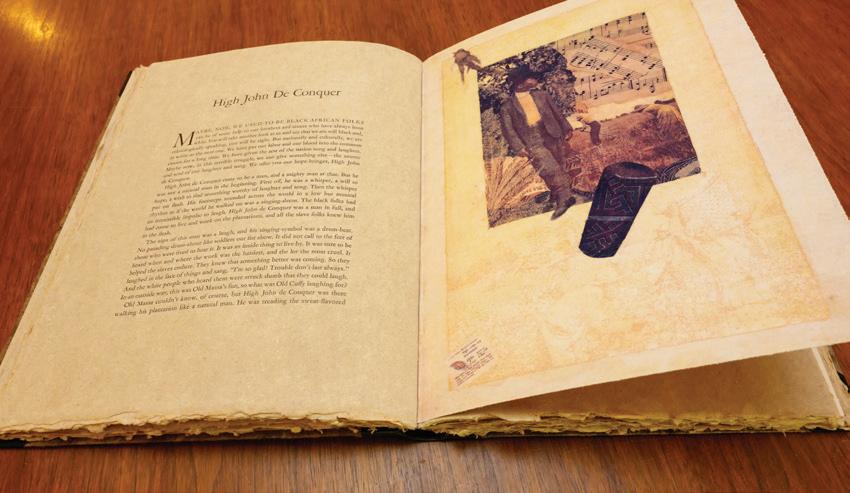
“Bookmarks in the Pages of Life: a Selection of Short Stories” is a limited-edition folio featuring short stories by Zora Neale Hurston with illustrations by artist Betye Saar. The text and illustrations are printed on handmade paper. Our volume is number 70 of the 300 copies produced and is signed by Saar.
ABOVE: “Bookmarks in the Pages of Life: a Selection of Short Stories” by Zora Neale Hurston (author), Betye Saar (illustrator), 2000
Finally, we made a purposeful and concerted effort to grow our artists’ book collection. Artists’ books are defined as a “medium of artistic expression that uses the form or function of a ‘book’ as inspiration.” Much like the zine collection, artists’ books provide representation of different subjects and lived experiences. Our most recent acquisitions range in subject matter and include queer themes, revisionist history, the Korean and Vietnam wars and Walt Whitman’s “Leaves of Grass.” n
OPPOSITE: “Agent Orange: An American Legacy in Vietnam” artist book by C. David Thomas, 2015
BELOW: “For Boys Who Dream of War” artist book by Alan Govenar (text) and Caren Heft (book design, printing, production), Arcadian Press, 2005

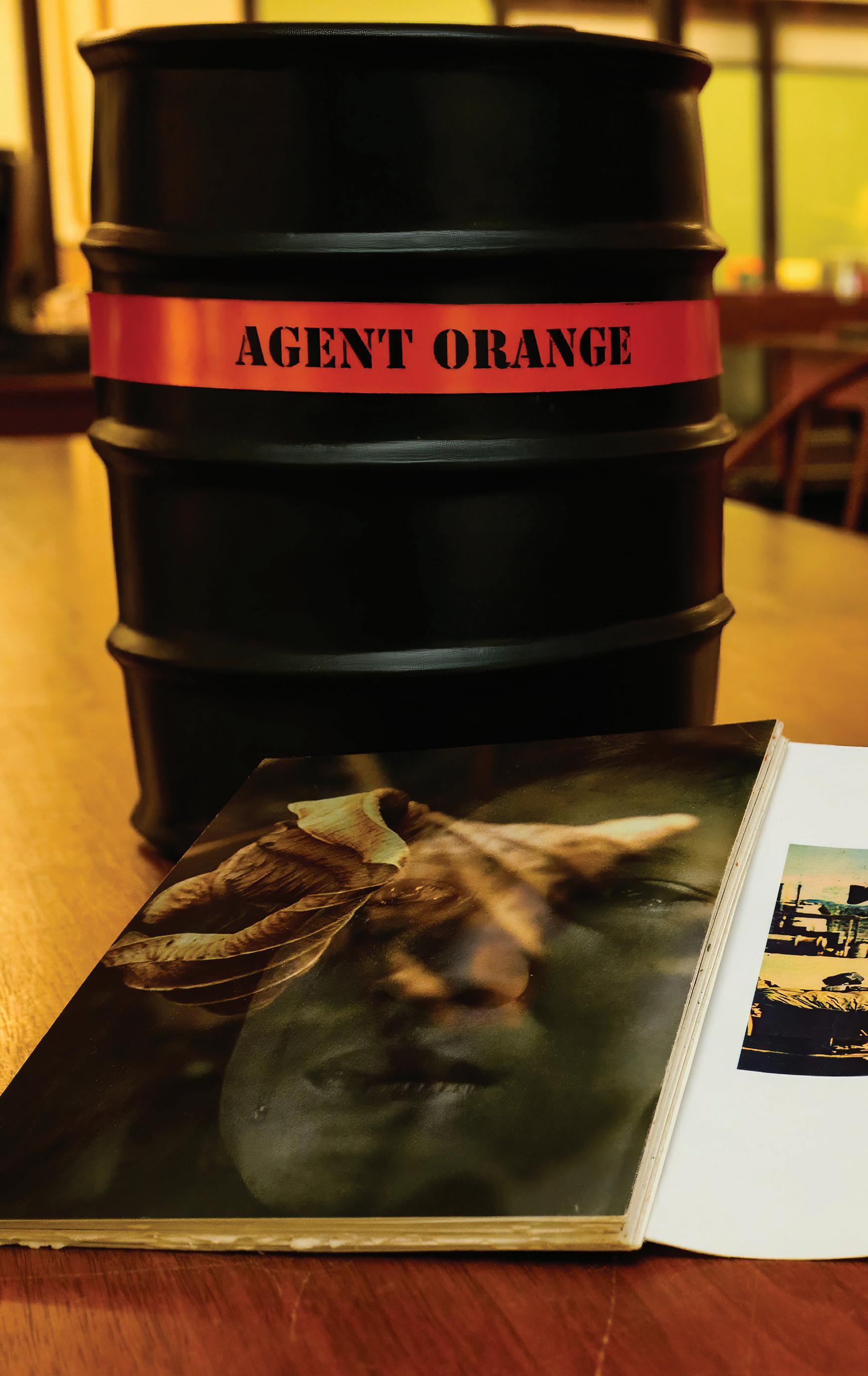

In addition to administrative tasks, library faculty support the collaborative work of the library through teaching, scholarship and research, professional activities and service work, both within and outside the university. Scholarship encompasses a wide range of activities and can include artistic, creative projects as well as more traditional pieces, such as academic articles and book chapters. Here is a quick peek into what some of our faculty have been doing in the realm of scholarship.
Paula Kiser (Digital Information Management and Education), Byron Faidley (Digital Information Management and Education) and Mattie Clear (Special Collections and Archives) presented a talk, “Community at Our Core: Washington and Lee University Special Collections and Archives and Community Partners Coming Together to Increase Access to Historic Collections,” at the Virginia Library Association-College and Research Libraries Chapter (VLACRL) conference in October 2023. Their presentation led to conversations with Stephany Hardy at Southern Virginia University, with W&L’s Special Collections becoming stewards of their archival material, including material from Southern Seminary. Paula, associate professor and digital scholarship librarian, is also currently editing a chapter for the upcoming book “Text and Data Mining for Librarians.”
Aside from this presentation, Mattie, assistant professor and archivist, also worked with Lily Jordan ’25, marketing chair for Mock Convention 2024, to curate an exhibition celebrating the history of Mock Con. The exhibition ran from January to May 2024. Over the last two summers, Clear has also worked with Summer Research Scholars Amelia Fisher ’24, Landon Rollins ’26 and John Paul Hammond ’27 to continue the processing and necessary description work to make the Henry Strouss Performing Arts Collection
From digital archives to knitting codes, research services resident librarian and assistant professor
Amira Walker showcases the diverse scholarship of W&L’s library faculty.
accessible. The collection consists of more than 10,000 playbills, and while still a work in progress, nearly half have been completed.
KT Vaughan, Hal F. and Barbra Buckner Higginbotham University Librarian, has presented on three topics this year. As part of the Leading the Charge cohort, she presented the findings and recommendations from the summer internship for undergraduates of color interested in librarianship as a career. This is now called the Career Exploration in Libraries summer program. She was part of a panel at the Virginia Library Association (VLA) conference in October 2023 and was part of a panel at the Inclusion, Diversity, Equity, and Accessibility in Libraries (IDEAL) conference in Toronto in July 2024. This work was supported by the Leading the Charge Institute of Museum and Library Services-funded grant, managed by Hampton University Library. In May 2024, KT presented the talk “Towards a Universal Design of Library Management” at the Conference on Academic Library Management (CALM). More than 300 people were registered for this talk, which laid out the basic principles of universal design and universal design for learning and how they might combine with other person-centered management theories and practices to create a management framework based on universal accessibility.
following this, in June 2024 at the Library of Virginia’s World Wide Knit in Public Day, KT gave a talk she has always wanted to give: “Knit Like Defarge: Encoding Meaning Into Your Stitches.” The purpose of this talk was to work through different ways to code messages into a knit item, in the spirit of the villain Therese Defarge in “A Tale of Two Cities.” Assistant professor and research services resident librarian Jenny Carlos (Research Services) has been focusing on learning about artificial
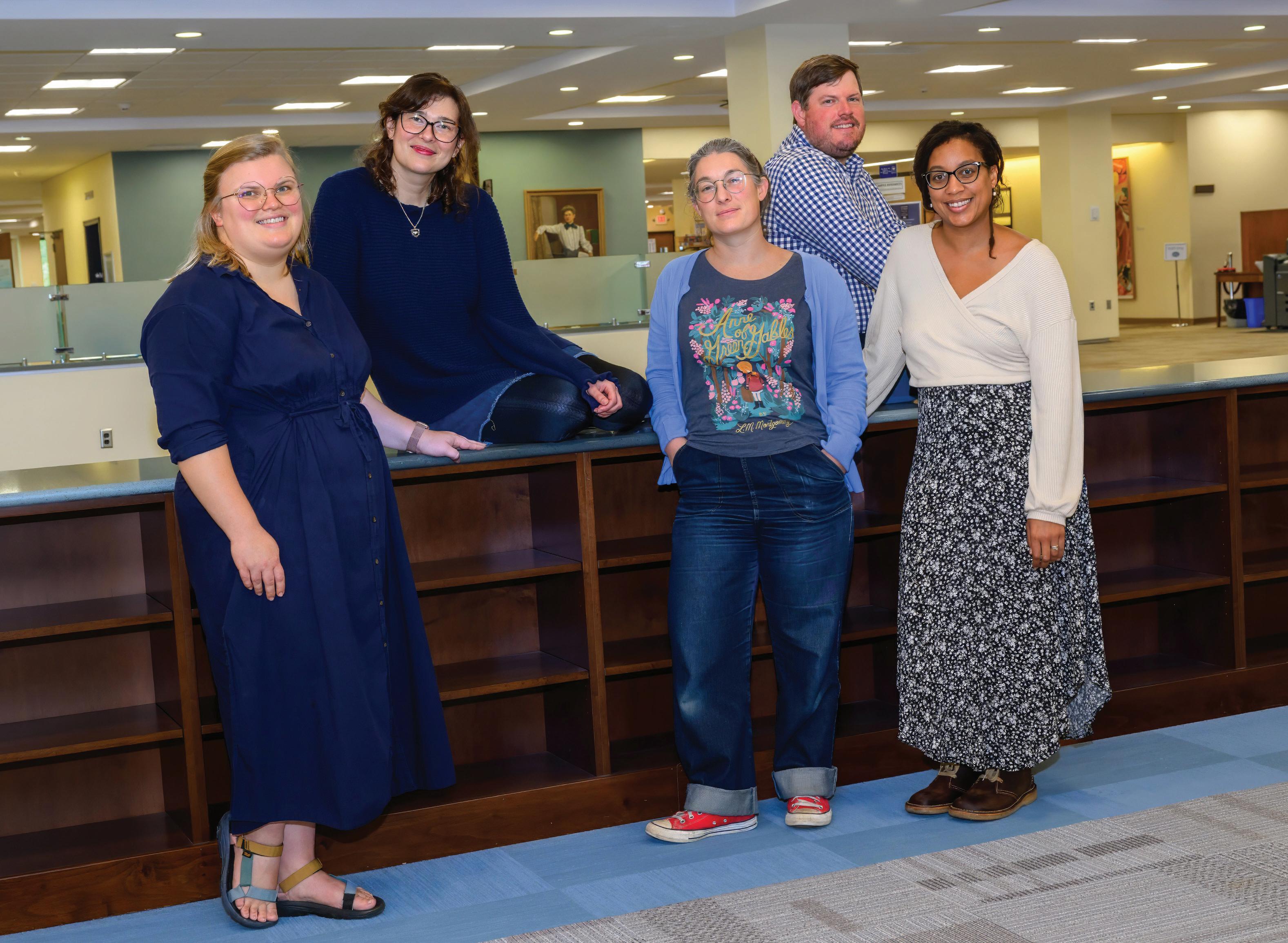
intelligence (AI) and how it can be applied to help our students and faculty be successful at W&L. In addition to attending numerous webinars and workshops, she has had two book chapters accepted: “Ethical AI Use in Academic Writing: A Librarian’s Recipe,” which she is writing with her colleague Kim Becker, and “How to Make an Effective AI Prompt in 7 Easy Steps,” which she is writing with W&L’s own Helen MacDermott, senior academic technologist. Finally, assistant professor and research instruction librarian Emily Cook (Research Services) and myself collaborated on a pre-
sentation for the Workshop for Instruction in Library Use (WILU) conference in May 2024. We drew on Emily’s years of experience creating in-class library tutorials to generate and deliver a 90-minute workshop titled “Game On: Creating Engaging Learning Experiences in a Post-Pandemic Playing Field.” Emily and I continued our collaboration in developing a poster for The Innovating Library Classroom (TILC) conference in June 2024. Our poster, which Emily cleverly titled “No Need to Reinvent Your Wheelhouse,” outlines local practices for sharing instructional materials. n

SCHOLARSHIP ENCOMPASSES A WIDE RANGE OF ACTIVITIES AND SERVICE WORK, BOTH WITHIN AND OUTSIDE THE UNIVERSITY.
Open call: The University Library invites W&L departments and classes to showcase their expertise and creativity as guest curators for our exhibit and display spaces. Curating an exhibit in the University Library offers a unique opportunity for scholarly exploration and creative expression. Over the past year, the main floor of Leyburn Library has been transformed into a vibrant gallery space, hosting a diverse array of thought-provoking exhibits.
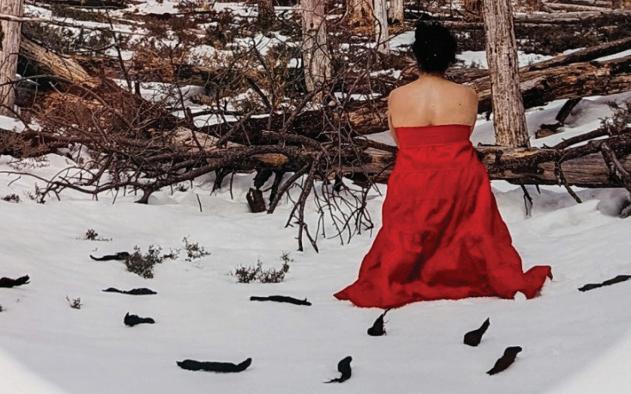

From April through December 2023, University Museums held an exhibit in Leyburn entitled, “We Love Life Whenever We Can.” Works in the exhibit were from the Arab American National Museum (AANM), a Smithsonian affiliate. On their website, the AANM describes themselves as “the first and only museum of its kind in the United States devoted to recording the Arab American experience.” The exhibit in Leyburn presented the cultural, historical and political legacies of five dynamic artists and scholars of Arab origin. Special care was taken by University Museums, with help from University Facilities, to make sure the lighting setup was suitable for the preservation and display of the artwork.
LEARN MORE: arabamericanmuseum.org
In April 2024, University Museums partnered with W&L's Office of Sustainability to celebrate Earth Month with a pop-up exhibition in Leyburn Library. The exhibit was co-curated by students involved in sustainability work across campus and showcased a curated selection of artwork from the University Museums’ collection. During a reception for the exhibit, students reflected on the artworks they selected and spoke to why sustainability work is so important.
LEARN MORE: 1) wlu.edu/arts/museums 2) my.wlu.edu/sustainability
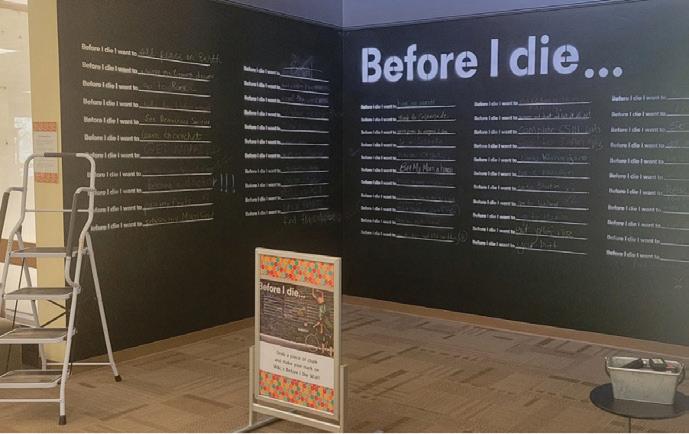
The Mudd Center for Ethics created a participatory exhibit in Leyburn titled “Candy Chang: Before I Die.” The exhibit ran from February to June of 2024. According to the Mudd Center’s website, Chang’s interactive work “reimagines how the walls of our public spaces can help us grapple with mortality and meaning as a community today. … Anyone walking by could pick up a piece of chalk, reflect on death and life and share their personal aspirations in public.” According to the artist’s website, there are “over 5,000 Before I Die walls in over 70 countries, including Iraq, China, Brazil, Kazakhstan and South Africa.”
LEARN MORE: my.wlu.edu/mudd-center
For information on guest curating an exhibit in Leyburn Library, Washington and Lee faculty and staff may contact Elizabeth Anne Teaff, associate university librarian for access and discovery, at teafe@wlu.edu . For upcoming exhibit schedules: go.wlu.edu/library-exhibits-calendar
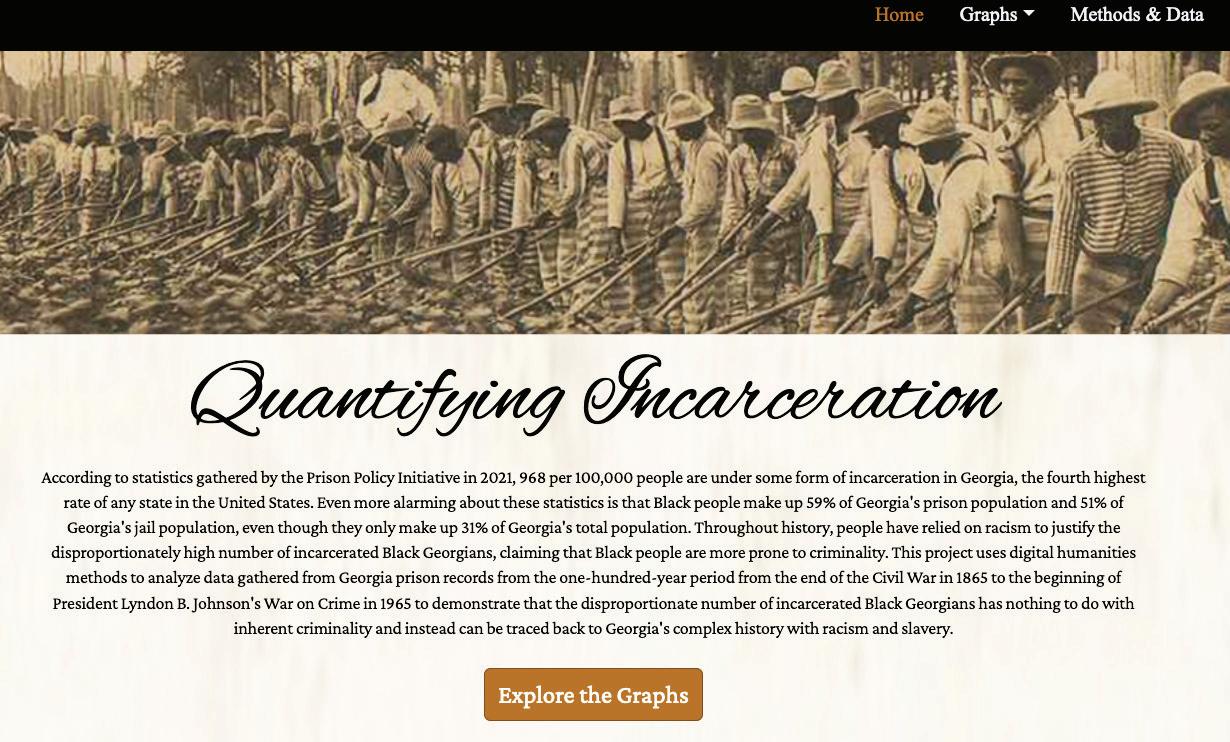
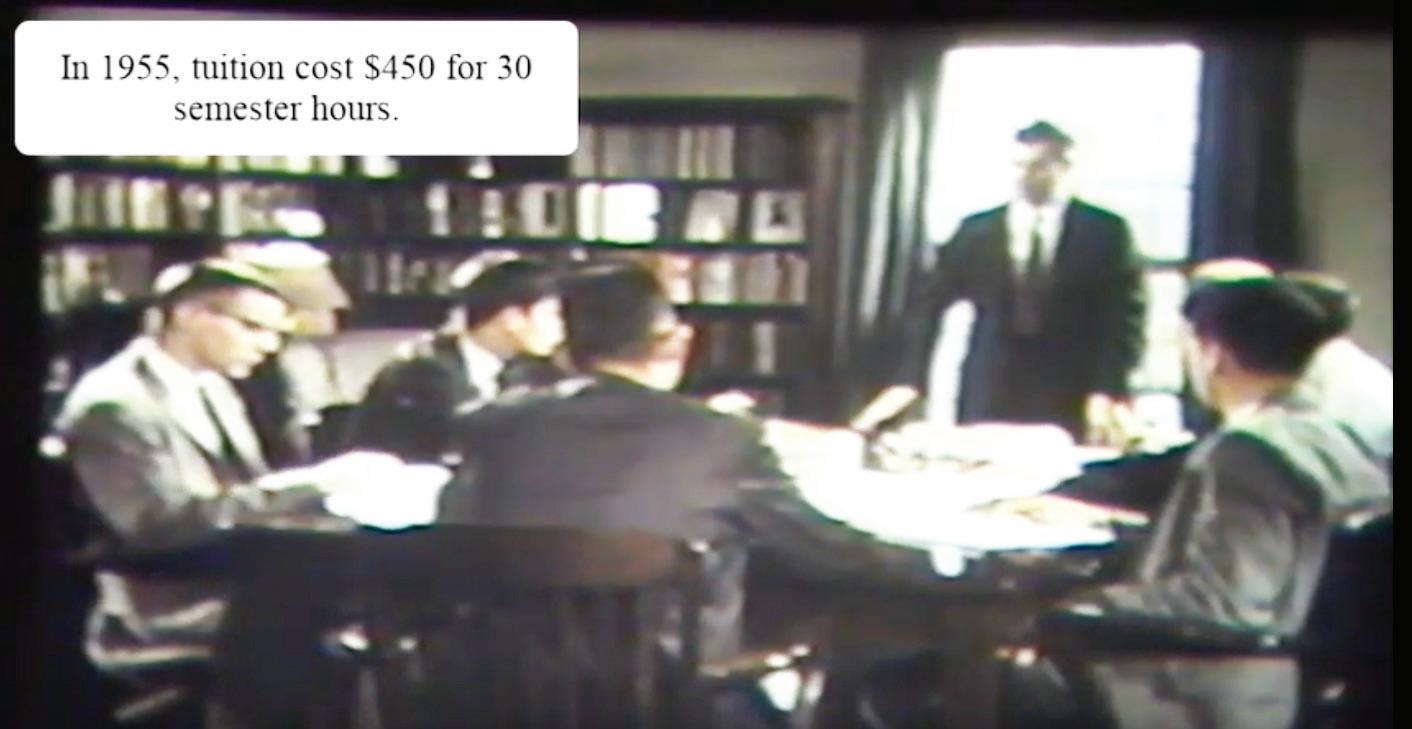

What
do digital projects, historical data and cybersecurity have in commom?
(Spoiler:
Mackenzie Brooks has the answer.)
one of the core tenets of our minor in digital culture and information is projectbased learning. In our courses, students design and carry out multimodal projects on a wide range of topics related to our digital world. They practice conceiving a topic and research question, surveying the literature, testing digital research methods and designing the public presentation of their results. By the time they reach the end of the minor, they are prepared to undertake a semester-long project on a topic of their choosing. The professor of the capstone course (Paula Kiser, associate professor and digital scholarship librarian, this year) provides guidance and scaffolding to help the students meet their goals. n

KAITLYN CHALKER ’ 24
“Quantifying Incarceration” was a combined honors thesis project with Chalker's history major and law, justice, and society minor. The project analyzed data gathered from Georgia prison records from 1865 to 1965 to demonstrate that the disproportionate number of incarcerated Black Georgians has nothing to do with inherent criminality and instead can be traced back to Georgia's complex history with racism and slavery.
AMANDA GALLOP ’ 24
“A Look at Washington and Lee Admissions & Marketing” was a look at 20th-century admissions videos produced by W&L. In an engaging “pop-up video” style, Gallop annotated the videos with comparative statistics and updated research about W&L. As a business major with an interest in marketing, this project gave Gallop an opportunity to take a retrospective look at marketing over time.
FORD SCOTT ’ 25
“Online Privacy and Security” is a public writing project designed to inform the general public about the complexities and realities of internet security and privacy. Drawing on his computer science major and general interest in cybersecurity, Scott crafted a website that clearly communicated the dangers and protections available, while also thoughtfully leveraging AI image generators to communicate his message.
Laura Hewett heaps a ton of well-deserved praise on this year’s cream of the crop.
several departments in the University Library hire student assistants each year. Many of them stay all four years; some are only around for a few. These students touch almost every aspect of the library. They assist in providing the W&L community with services that aid in achieving their educational goals. Each spring we ask our seniors to select a book that is meaningful to them. These books receive a bookplate that honors the students’ contributions to the library. There is also a display on the Main Floor of Leyburn Library during spring term through graduation. n
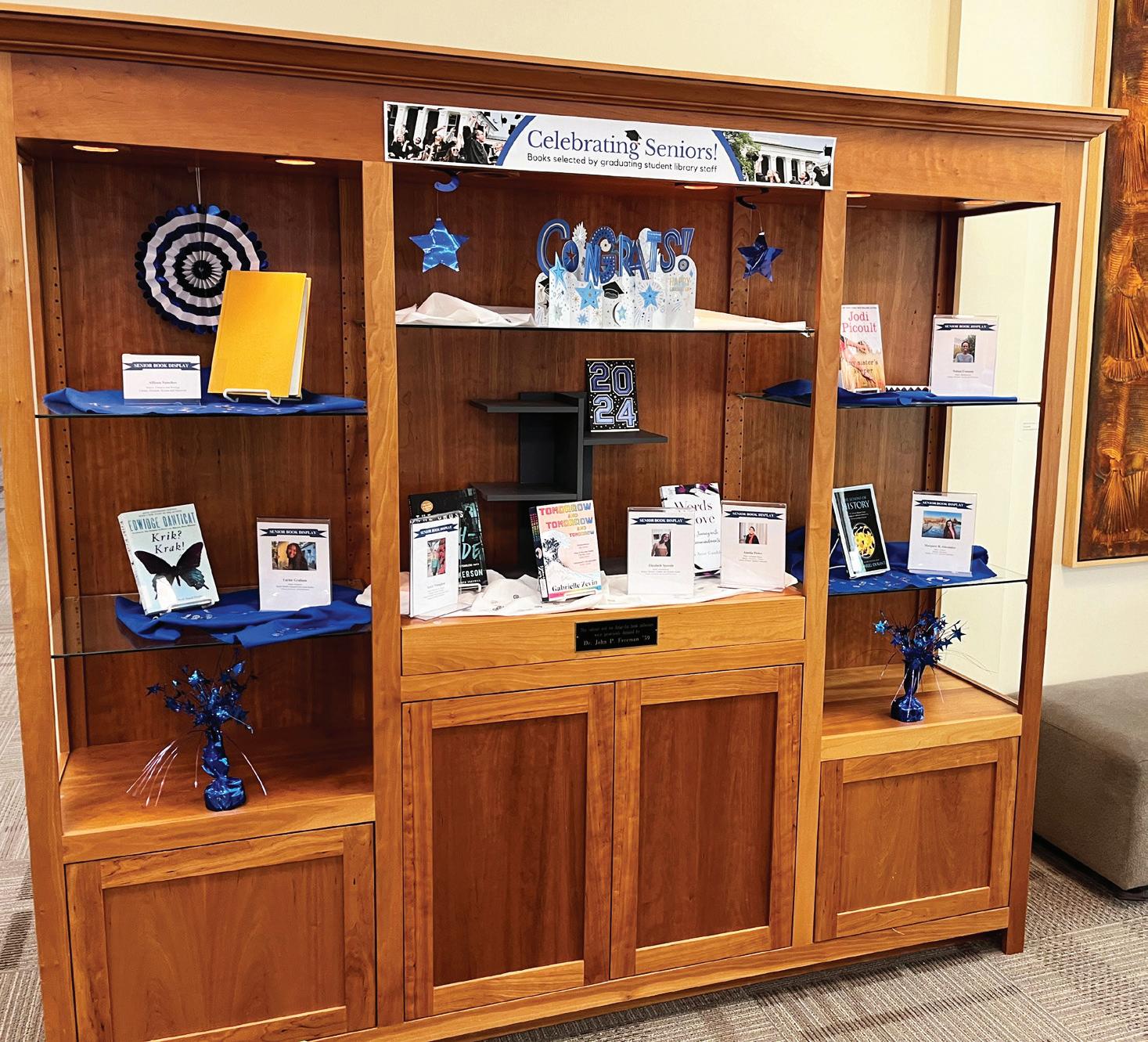
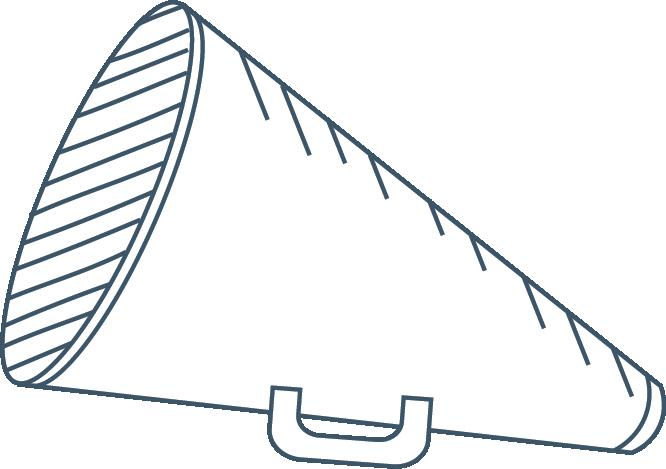
We'd like to give one more THANK YOU to the students listed below. We wish them all the best — they'll be missed!
Access Services
ALLISON SANCHEZ
ELIZABETH SJOVOLD
NEISSA USANASE
Administration
TAYLOR GRAHAM
Research Help
KAYLA MONAGHAN
Special Collections
MARGARET ALEXANDER
AMELIA FISHER
Brian Laubscher reveals the Library Journal Reviewer of the Year for 2023.
Julie Kane, professor and collection strategies librarian at Washington and Lee University, has been selected as a Library Journal Reviewer of the Year . Library Journal is primarily a trade journal for librarians with reviews of all types for librarians to use as a collection development tool. It also provides events and professional development opportunities for librarians.
Among the professional development opportunities is the Day of Dialog, a biannual online event featuring panel discussions by various authors. In addition to reviewing between six and 10 books per year, Kane has served as a Day of Dialog panel moderator since it moved online in 2020. Her Library Journal experiences often include opportunities for dialogue with award-winning
authors such as Hernan Diaz, who wrote the Pulitzer Prize-winning book “Trust.” Kane describes her work moderating those accomplished authors as “intensely demanding and exciting.”
Kane is one of four individuals selected for the 2023 Reviewer of the Year Award, joining Andrea Dyba from the Oswego Public Library (Illinois), Lauren Kage from Shaw House (Maine) and Anjelica Rufus-Barnes from the Prospect Heights Public Library (Illinois).
“This recognition is perhaps small, but mighty to me – the kind of thing I can tuck away close to my heart,” said Kane. “Reviewing is sometimes painful and sometimes joyful invisible work. Practicing other literary perspectives and considering other readers takes energy and time. It’s a lovely nod to get this kind of acknowledgment.”
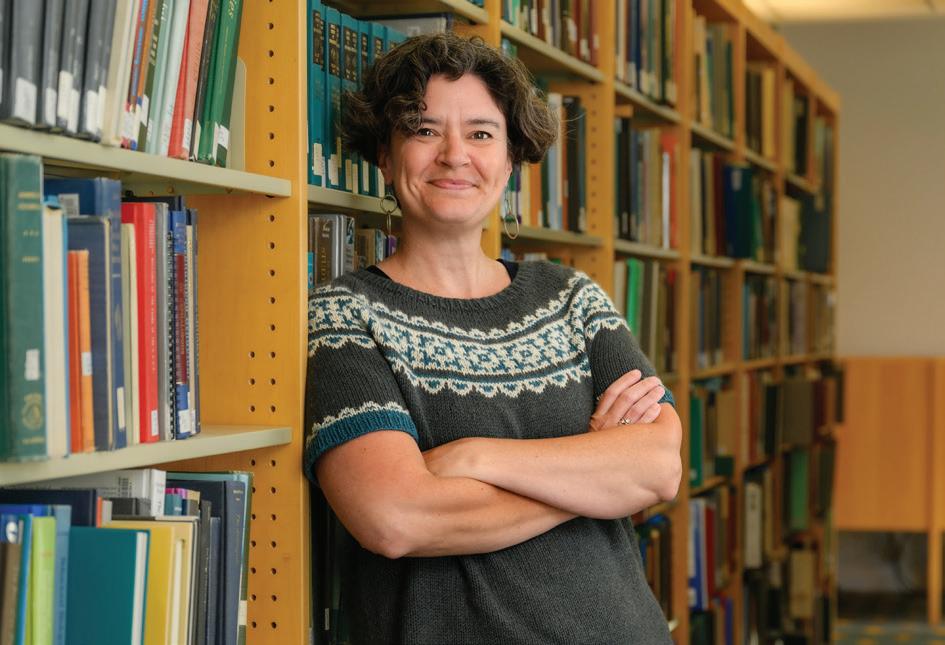
Kane has been a member of the W&L faculty since 2015. She holds a Bachelor of Arts in English from Mount Holyoke College, a Master of Arts in English language and literature from the University of Lynchburg and a Master of Science in library and information science from Simmons University. She also has a graduate certificate in digital humanities from the University of Victoria (B.C.). n
Think stats aren’t exciting? KT Vaughan will set you straight.
584,131 1,421,555 202
145
76 Total enrollment in DCI courses Print books Electronic books Online databases Guest lectures taught
2,037 Students taught War and Peace
9 DCI courses taught
267,904
Number of visits to Leyburn Library (through the main floor entrances)
13
11
42
804
Research questions answered
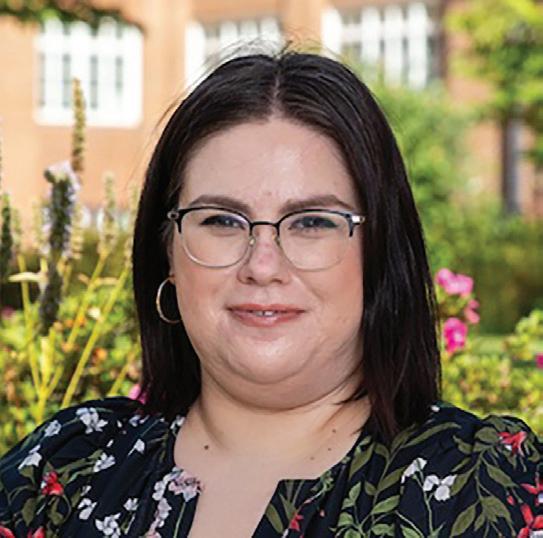
I came to the W&L community in December 2023 as one of the Williams School of Commerce librarians alongside John Tombarge. My research interests include how academic libraries can support first-generation college students, Latinx students and other minoritized student groups. My academic background includes an M.A. in higher education and a Master of Library Science and Information. n
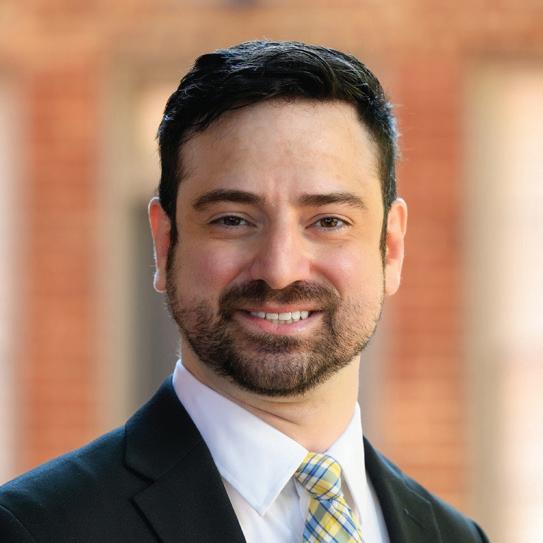
I was born near Reading, Pennsylvania (same hometown as Taylor Swift for all those Swifties out there!). I studied government in upstate New York at Cornell University. I received my J.D. from Columbia Law School, after which I was a litigator in New York and California. I am currently completing my Master of Library Science and Information at San Jose State University while working at W&L. n
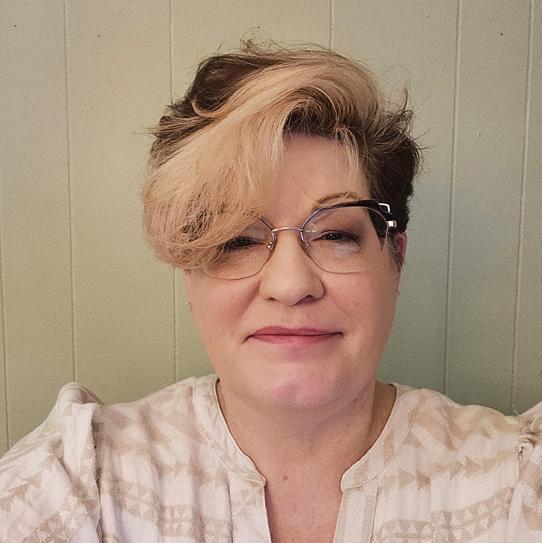
I joined the Law Library team in August 2024 as an administrative assistant. Prior to our arrival in Virginia in 2020, my husband’s work moved us to the Carolinas, where we lived for nearly 16 years. While there, I was a historical researcher for the Historical Center of York in York, South Carolina where I assisted the county archivist and helped community members and organizations research ancestry and notable past events. n
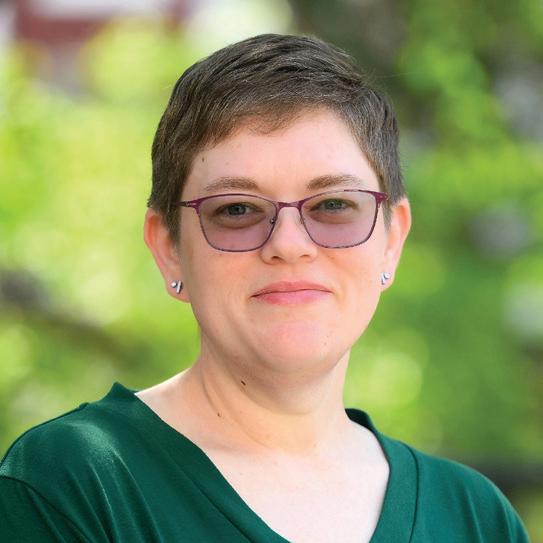
After eight years at Colorado State University and multiple years prior in Kentucky teaching first-year composition, I joined the University Library as head of research services and associate professor in July 2024. I have a Master of Education in learning design and technology, a master’s degree in library science, and a master’s in English. I'm excited to be leading the research services team. n
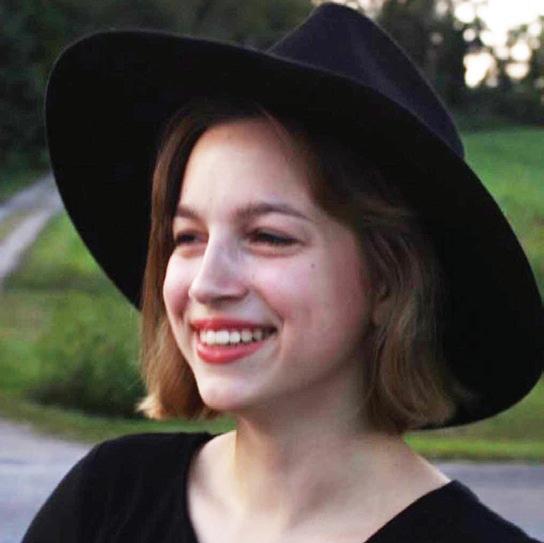
I was born and raised in Roxbury-Morristown, New Jersey, but moved to Virginia when I was 17. In 2023 I graduated from Southern Virginia University and received my bachelor's degree in English. I hope to get my master's in library and information science with a certificate in special collections and archives. I recently joined the W&L staff as the Special Collections and Archives intern. n
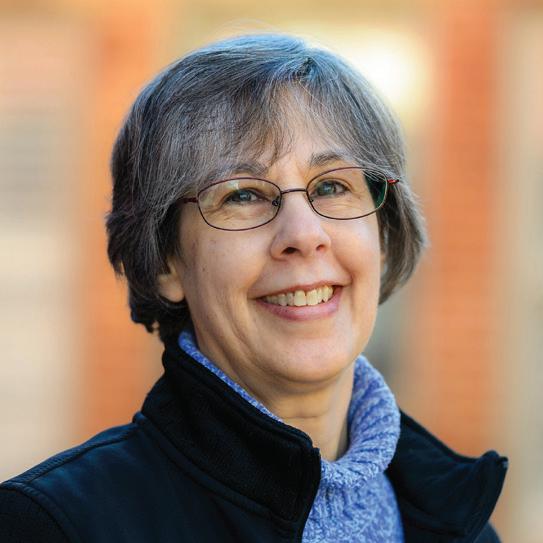
I joined the collection services team in February 2024 as acquisitions specialist. Prior to that, I worked at the Rockbridge Regional Library in the circulation and technical services departments. Most of my work life has involved organizing support services for adults with intellectual disabilities and providing education and service coordination for infants and toddlers with developmental delays. n
Save the date:
breaks it down.
Mark your calendars for 2026 as we proudly celebrate a remarkable milestone— the 250th birthday of the Washington and Lee University Library! Join us in honoring two and a half centuries of scholarly excellence and community support. This historic celebration is not only a tribute to our past but also a call to action. Help us ensure that our treasured oldest materials continue to inspire future generations by contributing to our restoration and conservation efforts. Please contact University Librarian KT Vaughan at kvaughan@wlu.edu to learn how you can support us in preserving our library’s legacy for another 250 years and beyond. Stay tuned for more details on how you can be part of this momentous occasion! n
Explore the curated collection of titles of the surviving “Liberty Hall Academy” volumes from the University Library’s catalog: go.wlu.edu/liberty-hall-academy
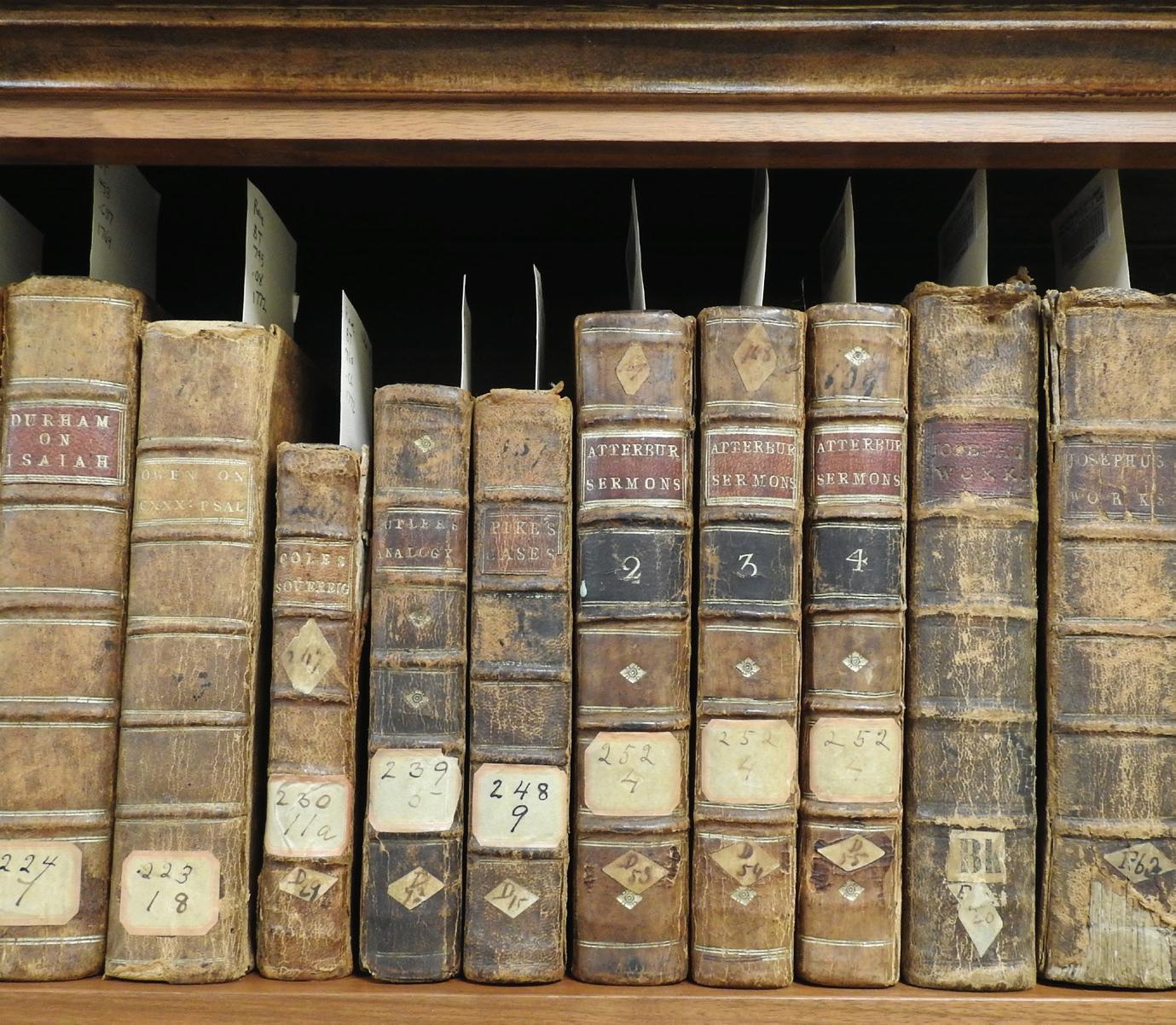
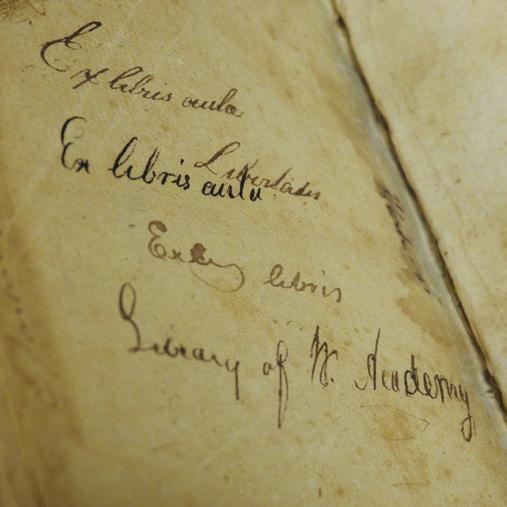
ABOVE: A selection of surviving volumes of the original Liberty Hall Academy library purchased in or about 1776 by academy president William Graham. The volumes are housed in W&L Special Collections and Archives. LEFT: An original Latin inscription “ex libris aula libertatis” meaning “a book of/from Liberty Hall” from the endpapers of a surviving Liberty Hall Academy library volume. This Latin phrase is included in the majority of the surviving volumes.
Wonjun Jo tries out our new grab-and-go Meescan system.
Wendy Rains
KT Vaughan
Mackenzie Brooks
Jenny Carlos
Kelsey Goodwin
Laura Hewett
Brian Laubscher
Jenny Mitchell
Kayla Monaghan
Kim Sims
Elizabeth Teaff
KT Vaughan
Amira Walker
Jamie Lipps
Billy Chase
Kolton Cannon publisher
Washington and Lee
University Library
204 W. Washington Street Lexington, VA 24450
talk to us library@wlu.edu
ON THE COVER:
Original artwork of Leyburn Library card catalog by Emmaline Nelsen

We’re here to support the academic mission of Washington and Lee University through activities which strengthen the University Library’s collections and services. We aim to foster closer relations between the library and the community, stimulate the intellectual life of the library users, and support library programming through monetary and in kind donations.
library.wlu.edu/friends